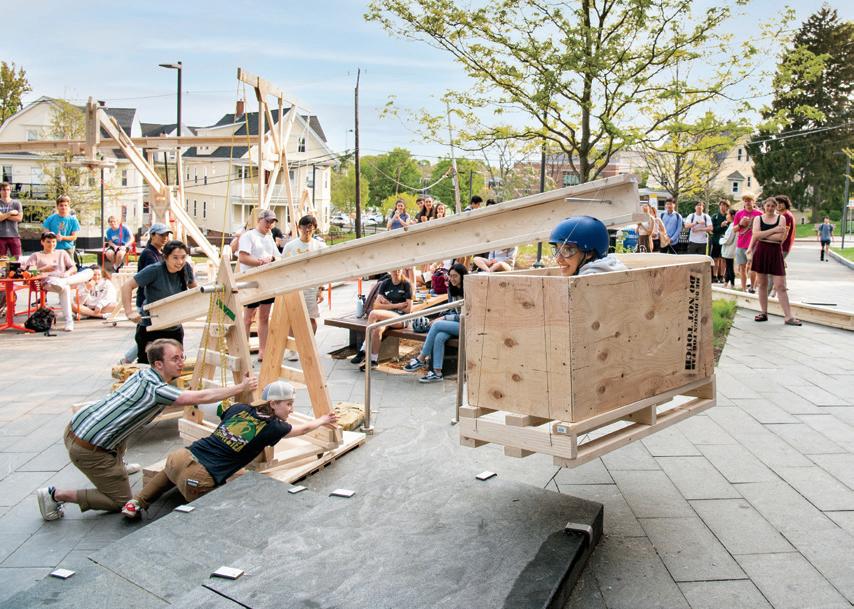
Which Engineering Major is Right for You?
Co-ops: Pursue a Professional Semester
Discover the New Entrepreneurship Minor, Only Open to Tufts Engineers



Which Engineering Major is Right for You?
Co-ops: Pursue a Professional Semester
Discover the New Entrepreneurship Minor, Only Open to Tufts Engineers

This magazine will introduce you to Tufts Engineering—through stories, not just stats. Most of what you’ll read was written by current students. Alongside them, you’ll step into projectbased courses, tour makerspaces, dig into fascinating research, and chat with potential classmates in the light-filled atrium of the Science and Engineering Complex. Along the way, you might notice: Tufts engineers are collaborative, innovative, and kind. They are engaged in social impact and entrepreneurship. They create like the world depends on it. This is Tufts Engineering; explore it.
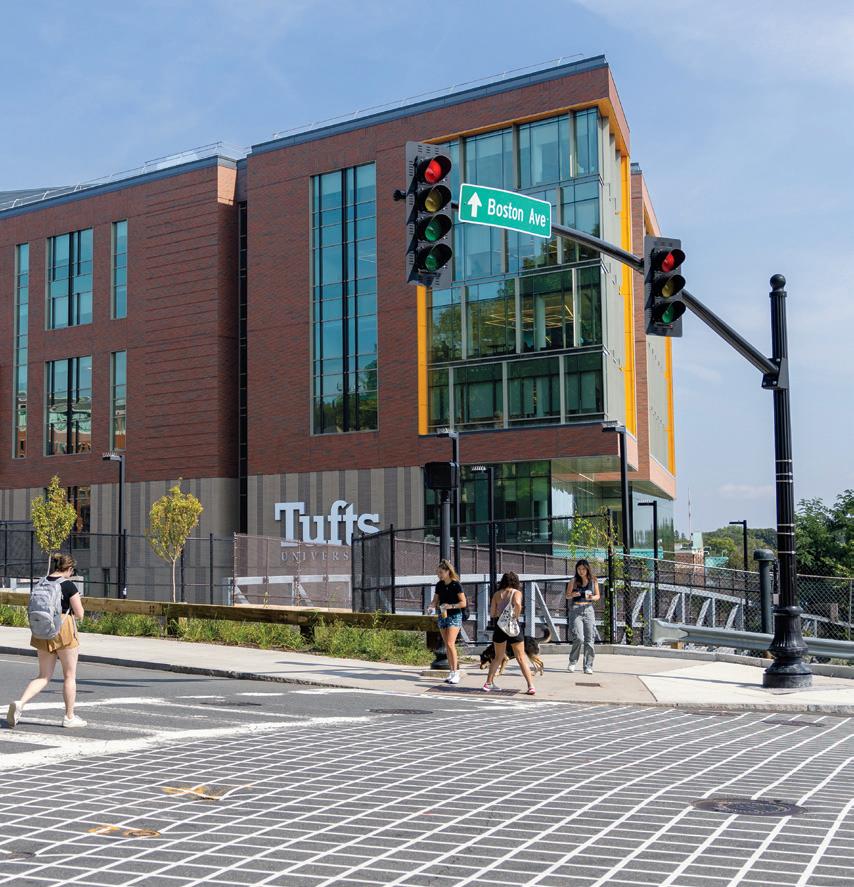

JUMBO ENGINEER is our introduction to an important component of our community, the Tufts University School of Engineering.
Embedded in a tier-one research university that is also a liberal arts college, the School of Engineering is a distinctively innovative place. It is a diverse community of students working in close partnership with expert faculty members in challenging classes and on cutting-edge research projects. It is one of the many places at Tufts where students apply their knowledge to real-world challenges, but one of the few where students speak a shared STEM language to do so.
As you learn more in the pages ahead about how Tufts approaches engineering, allow me to illuminate some of the traits I find to be most special about our program:
Our engineers are a diverse group. We are proud of the diversity of our engineers. Tufts is committed to building a diverse student body across the university, and our engineers are an important part of that commitment. In recent years, nearly half of the students of our entering engineering class identify as women, about half of US students identify as students of color, and one out of every seven first-year engineers will be among the first generation in their families to graduate from college.
As you collaborate in teams and small groups on many of your engineering projects, you will be expected to work with and learn from peers who bring different perspectives than you to the problems at hand. Because of this, you will graduate ready to enter an increasingly diverse workforce and tackle increasingly complex challenges.
There are multiple ways to be an engineer. The School of Engineering offers an array of majors, minors, programs, and research opportunities. Whether you want to explore well-known majors like environmental engineering, mechanical engineering, or computer science, or you want to try your hand at unique programs in disciplines like data science or music engineering, you will find a farreaching curriculum at your fingertips. Flip to page 18 of this magazine to hear from current students about each of the engineering majors Tufts offers and what sets them apart.
As an engineer at Tufts, you will also have access to courses and programs at the School of Arts and Sciences and the School of the Museum of Fine Arts. You do not have to forego your various intellectual interests while pursuing an engineering degree here.
Research is a cornerstone of our program. Engineering at Tufts is not simply about classroom learning. We expect our engineers to seek out opportunities to collaborate with our faculty in one or more of our research labs, and to seek out our faculty as research mentors in their own projects.
The School of Engineering is known for outwardfacing engineering that strives to improve the lives of people and solve problems in the world. From designing more efficient catalysts, to reading EM waves off of computer chips to break encryption algorithms, to engineering-specific study abroad opportunities, this issue of Engineer will introduce you to some of the innovative work taking place at Tufts.
I hope you find this issue of Engineer to be an engaging introduction to the Tufts University School of Engineering. I hope to welcome you to campus soon, and I wish you all the best in your college search.
Best,

JT Duck Dean of Admissions
BY KATHLEEN DOOHER
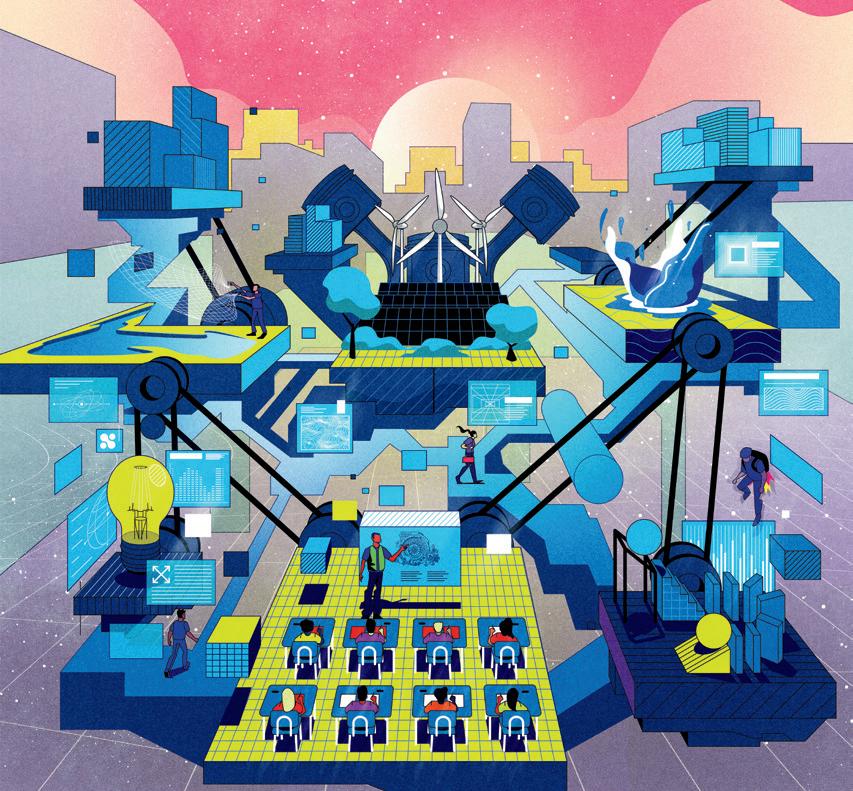
The Tufts School of Engineering is dedicated to educating a class of intelligent, thoughtful engineers who are driven to make the world a better place. Above are just a handful of the many ways that Jumbo engineers get involved and bring their passions to life while working for the greater good.
1. A Jumbo engineer was involved in the Tisch Summer Fellows Project cleaning the Mystic River.
4. In the $100K New Venture Challenge, Jumbos create startups and compete for funding while learning business skills.
2. Tufts’ Electrical and Computer Engineering Department’s REAP Lab is focused on renewable energy and photonics.
5. Tufts’ Student-Teacher Outreach Mentorship Program and the STEM Ambassadors have Jumbos volunteer to bring STEM education to local K–12 schools.
3. The WeREASON Lab in the Civil and Environmental Engineering department studies access to clean and safe water.
6. Find SOE-wide community at the FirstYear Engineering Design Challenge, where students build a Rube-Goldberg machine together.
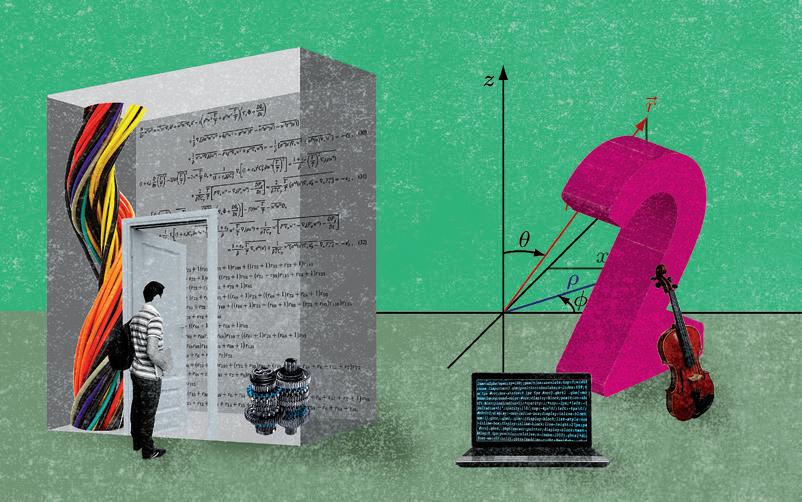
Think you want to be a Tufts engineer? If so, we want to help you get there. Here are our top tips for applying to the School of Engineering!
Determine if you’re an engineer
If the classes, research, and projects you read about here make you jump for joy: congratulations—you’re an engineer! But if you’re on the fence between majors like biomedical engineering and biology or chemical engineering and chemistry, take a look at the online “degree sheet” for your intended major by visiting the Tufts website. If the engineering major entices you more than the option you are considering in the School of Arts and Sciences: congratulations—you’re an engineer! Still unsure? Talk to current students, faculty, counselors, and family members. Then go with your gut and apply to whichever program feels like the best fit for you.

Our engineers typically take around 38 classes during their undergraduate time at Tufts. And, as you hopefully can imagine, STEM courses logically make up a good amount of those 38! Our admissions committee does a deep dive into applicants’ math and science high school trajectory. Our most competitive applicants will be in the most advanced science and math courses their school offers. It’s okay and even encouraged to specialize a little bit your senior year. If you choose to forego a fourth year of foreign language in order to double up in math or science, that’s a decision we understand as we review your transcript. But also embrace any electives that let you celebrate your inner engineer. Computer science, woodshop, orchestra…they all show an aptitude and mindset for engineering. Tufts celebrates that interdisciplinary mindset; after all, our engineers have to take eight courses in our School of Arts and Sciences as part of their curriculum.
Your school counselors and teachers are some of your biggest advocates in this process. Tufts requires one counselor recommendation and one teacher recommendation (but yes, you can send us more than one teacher recommendation). For engineers, it is especially helpful to have a recommendation from a math or science teacher. Instead of asking a teacher who doesn’t know you well but who gave you an A+ on every assignment (because that teacher will inevitably talk about all of your A+s, which is already something we know from your transcript), ask a teacher who truly knows you and can write stories and anecdotes to help us understand you better as a community member, collaborator, and tinkerer.
Tufts engineers aren’t just math and science whizzes. They are also playful, creative, collaborative, logical, enthusiastic, and grounded. In your essays, we’ll be looking for the soft skills that will make you a great engineer and the je ne sais quoi that will make you a great Jumbo. While you shouldn’t feel pressured to write about engineering specifically, do ask yourself if the topics you tackle showcase those attributes. And if writing isn’t your thing, don’t panic! Do the best you can with the task at hand, then feel free to show us your engineering skills through the optional Maker Portfolio.
ENTREPRENEURSHIP is the most popular minor for students in the School of Engineering, and for many reasons. Learning new techniques in innovation and business help strengthen our engineering students’ interdisciplinary skills and intellectual curiosity. This ExCollege course fits perfectly in line with this thinking. Taught by a Tufts alum and trustee, students will learn the ins and outs of financial metrics and valuation tools, along with behavioral analysis and basic psychology, to better understand how and why people invest in the ways that they do.
PROFESSOR Matthew Panzer was recently appointed as the next Dean of Research for the School of Engineering. Professor Panzer serves as a tenured professor in the Department of Chemical and Biological Engineering, and is now responsible for fostering collaboration between SOE departments, other Tufts institutions, and members of our broader community on engineering projects.

A REAL YET RANDOM, PLAYFUL YET SERIOUS SPIN AROUND CAMPUS—AND JUST BEYOND
THE TUFTS GORDON INSTITUTE, which fosters entrepreneurial spirit and engagement within the School of Engineering, opened the Auster Center for Applied Innovation Research. With a focus on interdisciplinary research dedicated to finding solutions to pressing societal problems, Jumbos will gain hands-on experience learning how innovation can support the public good. Bring your curiosity and passion to new heights!
TUFTS PROFESSOR AND DEAN of Graduate Education
Karen Panetta was recently elected to the National Academy of Engineering. In this incredible accomplishment, her tireless advocacy in support of women in STEM programs and expertise in computer vision and simulation algorithms were highlighted. As the first woman to receive tenure in the Department of Computer and Electrical Engineering, her legacy and impact on Tufts and the broader community are unparalleled. Many congratulations!
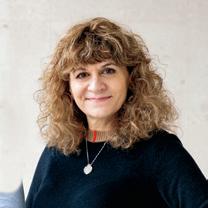
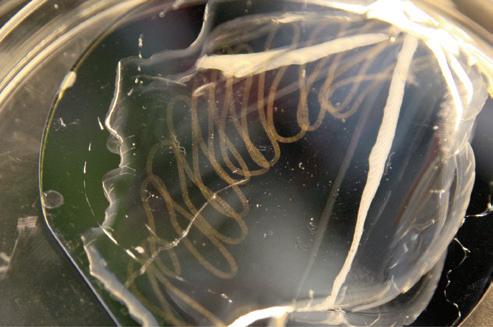
HAVE YOU EVER wanted to read a poem on the go, but don’t want to carry anything in your hands? Well, with the recent research conducted by professors David Kaplan and Fio Omenetto, you may soon be able to! One project includes nanomaterials set in silk that can be implanted and monitored under the skin. Author Jen Bervin recently collaborated with the lab to work on another project, specifically imprinting poetry and other written text on the liquid silk that can be implanted and later seen under certain spectrums of light. Innovation knows no bounds!

WHO SAYS engineers can’t study abroad? Thanks to the 10 Tufts programs abroad and over 150 pre-approved programs available to Tufts students, the world is at your fingertips, regardless of major. With multiple engineeringspecific programs like the summer program focusing on data and computer science in Pavia, Italy, or the semesterlong opportunities through Tufts-in-Chile or Tufts-in-Hong Kong, Jumbos combine their many and varied interests while traveling around the world.

Dean Kyongbum Lee credits an abiding mentorship as the bedrock of his professional career—both that which he has received and his ability to provide it to students at Tufts. Speaking about first discovering Tufts, he said “I was looking for a place where I could continue my research. But it was also important to me that it was at a place where I felt I could also be very engaged in mentoring students. That was something of value to me in my workplace. The advice I had from my mentors, and who I credit largely for getting me enthusiastic about being a professor, was to find a workplace where what you want to do is also what the workplace wants to do.” That alignment of values has been instrumental in shaping Dean Lee’s time at Tufts, where he has taught, researched, and administered for two decades. “I felt that the Chemical and Biological Engineering department at Tufts really did care a lot about the student experience as much as they cared about the research you do. That was a really good fit for me.”
The close connections that students can make with their professors while still doing deep and varied research is a hallmark of the Tufts undergraduate experience. That variety of experience extends beyond the tools of Dean Lee’s lab, however. His intellectual curiosity is far reaching and nonlinear, like his path to the field of chemical engineering in the first place. “Both of my parents
went to law school. As immigrants, they felt that I should study something quantitative because… it would be difficult to be successful in fields that were more subjective. Something quantitative is quote-unquote less subjective, which, of course, is a limited way of looking at disciplines.” A passion for multiple, seemingly disparate, disciplines is what initially drove Dean Lee’s academic life. “I liked math and chemistry in high school, but I also really liked my history classes and literature classes and languages. When I started college, I actually was going to double major in German literature and chemical engineering. Later, I realized that I appreciated the rigor of chemical engineering… mainly because I felt the engineering curriculum at Stanford, where I went to college, was set up to teach students to solve problems and perform rigorous analysis to find solutions that have an impact.”
Research plays a major role in Dean Lee’s professional life, something which he describes as “joyful.” His research lately has focused on gut bacteria and the “metabolism, or the process that living things use to take chemicals from the environment and turn them into resources…One of the most interesting outcomes of the Human Genome Project was the fact that they found many, many more bacterial genes in the human body than human genes. Several hundred times more.” Studying the chemical relationship between the many human and
bacterial genes drives his work. “My lab is interested in studying how bacteria communicate with the human body. As a chemical engineer, I look at chemical interactions and study complex chemistry [and in this case] look at the chemical communication between the bacteria and the human body.” But research is about more than just an academic interest—it is also professionally rewarding. “One of the things that I think you have to be as a leader is to be authentic. It’s easier for me to be authentic about research and what it’s like to mentor students when I’m doing it myself.”
For upcoming plans, Dean Lee is excitedly looking forward to teaching again. “Tufts is one of those places where you can be an administrator but also a faculty member. That’s an important connection I can have with my colleagues. I can appreciate the challenges and joys of teaching and running a research group.” Engaging with people to accomplish good in the world is part of the School of Engineering’s distinctive character. “We have a strong culture of student engagement here…What I would like to do as an engineering school is come up with unique solutions [to the world’s problems] that people will embrace.” And with passionate leaders like Dean Lee here to guide and support Tufts undergraduates, there is little that can stand in the way of that goal.
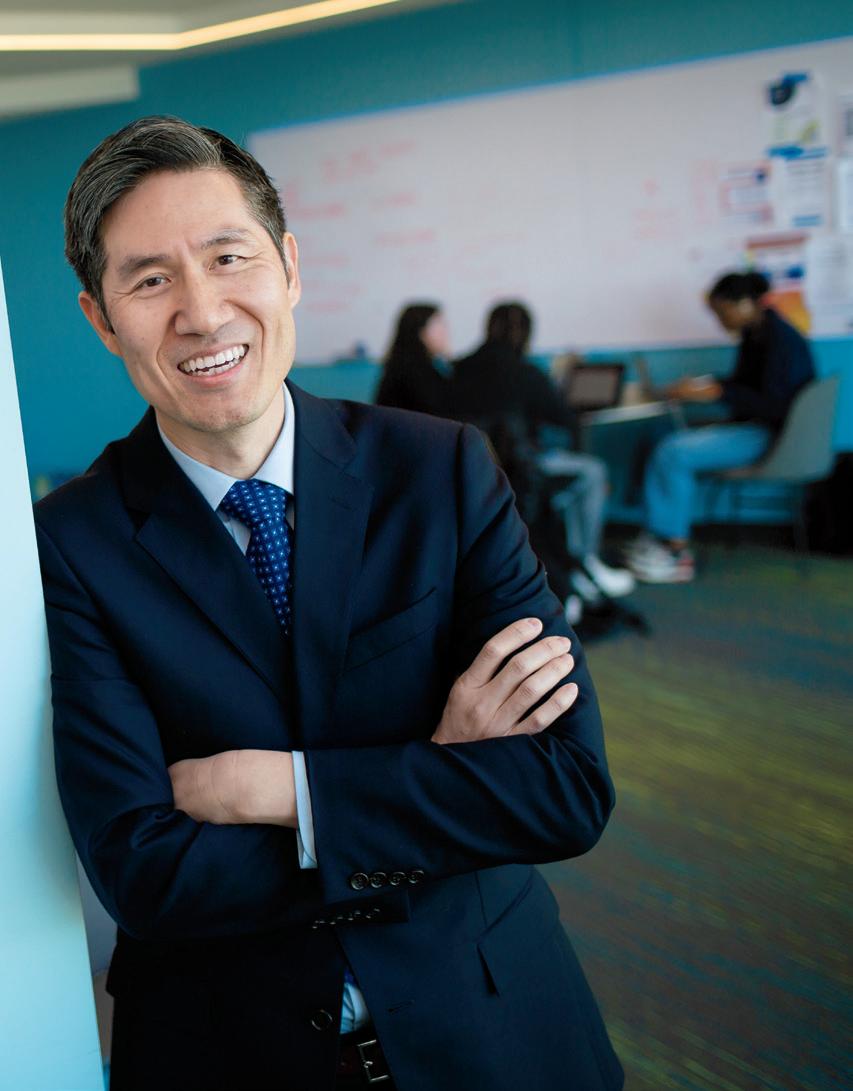
“I was looking for a place where I could continue my research. But it was also important to me that it was at a place where I felt I could also be very engaged in mentoring students.”
Are you passionate about engineering but also business-savvy? Interested in realworld applications of your knowledge in the greater Boston area’s thriving startup scene? Just want to learn something new— and maybe discover a new passion along the way? Tufts Gordon Institute is just one of the ways that innovation-minded Jumbos can learn new skills, get involved in the broader community, and even find funding for their own projects! Read on to get a rundown on the entrepreneurship scene at Tufts.
Tufts Gordon Institute Offers New Minor for Engineers
The foundations for future leadership minor, launched in Fall 2023, aims to provide Jumbo engineers with the skills and mindset to become innovative leaders who tackle the complex challenges facing our society.
In addition to serving as the foundation to a student’s education, the minor will also act as a gateway to additional studies in leadership, innovation, management, and entrepreneurship. The cluster of specialties at Tufts Gordon Institute and the Derby Entrepreneurship Center at Tufts (DEC) collectively reach 15% of Tufts undergraduates, including the entrepreneurship minor—one of the most popular minors at Tufts.
Reflecting on the new foundations for future leadership minor, Director of Programs & Operations for Tufts Gordon Institute and faculty lead Will Trevor, shared, “This minor will help to develop the next generation of leaders who will have an important role in transforming society, while also teaching them vital skills in financial literacy, communications, and the importance of acting with an ethical purpose. Central to the mission of the Tufts Gordon Institute is developing transformative leaders with heart, and this minor helps spread that vision to all Tufts students.”
To receive this minor, students complete three half-semester core courses in Leadership, Communications, and Financial Literacy, and at least one elective course from Tufts Gordon Institute’s portfolio of 100-level courses. This minor is available exclusively to students in the School of Engineering, however students across other Tufts schools are invited to take the cluster of courses as an addition to their studies.
George Blount, Lecturer at Tufts Gordon Institute, shares the educational goal that drives him and his fellow faculty in teaching the foundations for future leadership minor: “Our aim is to help the next generation of leaders, whatever their chosen career path, to develop the skills and mindset to make a real difference in the world and take from their Tufts education a sense of profound purpose to use their leadership skills for the benefit of all society.” Blount teaches the course Mastering Money: Developing Financial Literacy, in which students learn sound money management in personal and professional finance. In addition to developing financial awareness and vocabulary in students, the course teaches basic business finances such as budgeting, accounting statements, and taxation.


The entrepreneurship minor helps students develop an entrepreneurial mindset and skillset they can apply to their life after graduation—whether they plan on entering graduate school, starting or working for a startup or small business, joining a larger for-profit or non-profit organization, or joining a government agency. The minor offers more flexibility than ever. Students can earn the minor by taking one foundational course plus 12 additional credits from a wide selection of options, at least six of which must be core courses. The DEC also offers the entrepreneurship for social impact minor in partnership with the Tisch College of Civic Life for students who want to drive social impact while solving today’s most pressing problems through innovation.
Beyond its academic offerings, the DEC supports entrepreneurship and innovation across Tufts University through a variety of co-curricular activities including competitions, one-on-one coaching, workshops, and events including cross-university mixers, competitions, and the Tufts Venture Accelerator. For students who want entrepreneurial methodologies but aren’t working on a new venture just yet, the internship program and the Entrepreneurial Initiative Fund help encourage them to just get started.
Throughout the year, DEC hosts an entrepreneurial speaker series where entrepreneurs, investors, and thought leaders share their real-life stories—both struggles and successes—in fireside chats and panel discussions. Students can also take advantage of access to DEC’s one-on-one coaching sessions with entrepreneurial experts, including DEC’s three Entrepreneurs in Residence. For students looking to gain hands-on experience in a startup, DEC offers several Internship Grants that help in supporting students when a newly formed venture does not have the funding to do so themselves.
When students and alumni are ready to put their newly gained experience to the test, they can compete in competitions hosted by the DEC, including its flagship competition: the Tufts $100k New Ventures Competition. In this challenge, early-stage innovators and entrepreneurs pitch their ideas in three tracks: General Technology, Social Impact, and Healthcare & Life Science. The competition welcomes applicants across the Tufts community from undergraduate and graduate students to recent alumni, faculty, and staff across all 11 schools and colleges at Tufts. The competition culminates in live pitch competitions at the semifinals and finals, where competitors vie for cash prizes of over $100,000 along with additional in-kind services.
The opportunities for Tufts students to learn about leadership and entrepreneurship through Tufts Gordon Institute don’t end at the newest minor. For students seeking a minor that will empower them with essential leadership skills based in real experience and engineering practice, Tufts Gordon Institute also offers the engineering management minor which teaches leadership skills in areas such as product and process development, communications, financial planning, and product management. Students who graduate with the engineering management minor are prepared to be leaders and innovators in a rapidly changing, tech-driven world.
All of these undergraduate offerings connect students to the wider Tufts Gordon Institute and Derby Entrepreneurship Center at Tufts community. With an international network of students, alumni, faculty, staff, and industry experts, members of the Tufts Gordon Institute community constantly reconnect at events such as alumni nights, Keynote Debates, the annual Backyard Bash, and more. Whether students are interested in advancing their leadership career, launching a new venture, or transforming their innovative ideas into impact, Tufts Gordon Institute and its worldwide community of transformative leaders with heart are ready to help.
9:00 AM
Go to the Fitness Center and lift!
10:30 AM
BIO 130 Animal Behavior: Professor Starks

4:30 PM
ENP 161 Human Factors
12:00 PM
Stop by the Nolop makerspace to laser cut or engrave a new project— maybe an engraved charcuterie board?
1:30 PM
ME 40 Engineering Design 1: Professors Hannon, Liesk, & Chiesa
3:00 PM
CSHD 125 American Sign
Language 2: Professor Applegate
Production Design: Professor Intriligator
6:00 PM
Study (or nap) at the Women’s Center
7:00 PM
Stop by Dewick for dinner with friends
7:30 PM
Volunteer with Tufts Food Rescue Collaborative (I worked a shift once a week packing excess dining center food—now I’m a coordinator!)
8:30 PM
Work a shift at Ginn Library (I’m a circulation worker at the front desk)
8:30 AM
Wake up and grab some morning hot chocolate from Kindlevan Cafe!
9:00 AM
Learn more about the various routes of drug administration in BME 165 Principles of Controlled Release and Drug Delivery.
10:30 AM
Next up: fluid mechanics and more engineering fun in ChBE 21 Transport Phenomena I.
12:00 PM


Walk to either the Joyce Cummings Center or the FIRST Resource Center to take a “breather” nap and chat with my best chums. Naps = good!
No day is alike for any two Tufts engineers—so we asked three Tufts engineers to share a day in the life, complete with classes, snacks, and shenanigans.
5:00 PM
Quick dinner at DeWick and catching up with friends!
1:30 PM
Final class of the day *drum roll*... ChBE 11 Thermodynamics! Heat, enthalpy, reversible processes, all that fun stuff.
3:00 PM

Stop by Hotung Cafe to grab a well-earned açaí bowl and find a spot at the Campus Center to get a headstart on work.
6:00 PM
Part-time job as a lab assistant at Pearson Chemical Lab.
8:00 PM
Head back home… or take a quick trip to Davis Square via the Tufts shuttle and get a boba tea drink. It’s a wildcard!
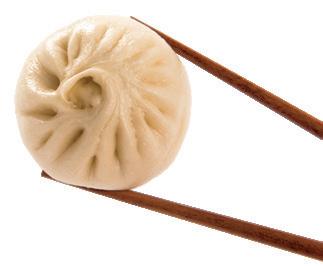
8:00 AM
Shower, and get breakfast from Dewick (if I actually woke up on time) or Kindlevan (if I’m running late)
6:00 PM
The real work begins! This evening time is usually devoted to partnered homework assignments, as this is when most people are available to work
8:00 PM
11:00 PM
Wind down for the night and start catching some “Zzzz”s.
11:00 AM
Either host office hours, or run a lab for CS 11, the introductory computer science class
1:30 PM
CS 21 Concurrent Programming: Professor Sheldon
3:00 PM
Look over/rehearse music for MUS 81 Concert Choir, the auditioned curricular choir at Tufts
4:30 PM
CS 116 Intro to Cybersecurity: Professor Chow
I almost always grab dinner with whoever I’m working with at some point before 9. The default choice is Dewick, but if we feel like switching it up, we can go to Carm. Or, if we’ve had a particularly successful day or are planning on working late into the night, we might indulge ourselves and order out from Dumpling Kitchen or a Pho place
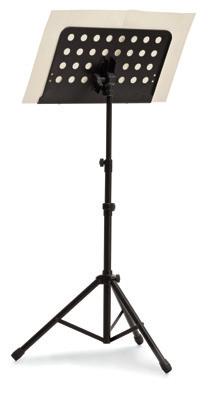
Each year, we like to highlight a department’s courses that strike us. Maybe they excite our intellectual curiosity, or illuminate something we’d never considered before, or help us better understand something we thought we knew. Below are a collection of scintillating choices from the Department of Electrical and Computer Engineering that will hopefully do the same for you!
BY VALERIA VELASQUEZ ’23
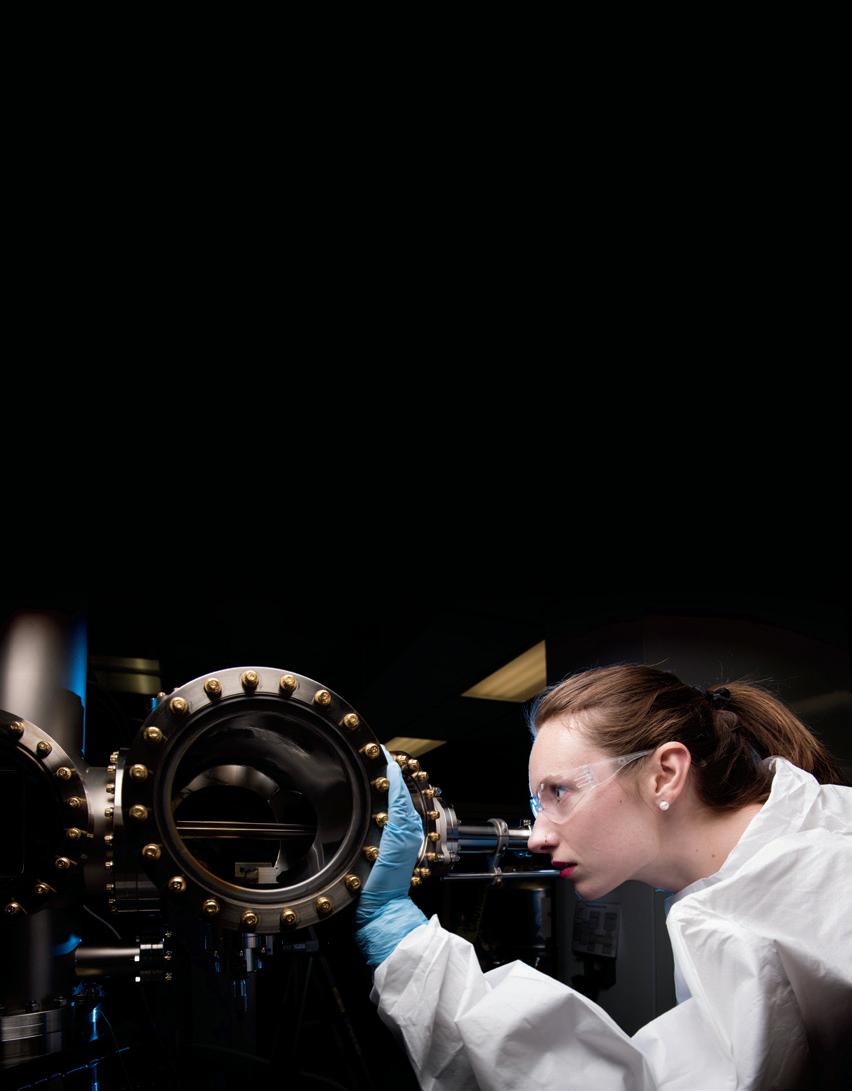
EE 193-03 Special Topics: Wearable
Interested in engineering design that combines a variety of disciplines, such as human-centric design, computer science, and material science?
Want to learn about the method behind the innovative technology geared toward the healthcare field? This course teaches students about wearable system design, which refers to creating wearable devices that integrate computing with the human experience. Important considerations in this field include balancing excellent design with battery management and ensuring that all parts of a complex system–sensors, data processing, and form–work together seamlessly. This course will focus on designing health monitoring applications and will challenge students to prototype for realworld clinical challenges.
EE 193-01 Special Topics: Nanophotonics
Technology is getting tinier and tinier. In fact, nanophotonic devices, which can trap bend or otherwise alter light, are now being printed on millimeter-sized chips the size of a grain of sand! In this course, engineering students examine the key components behind the cutting-edge field of nanophotonics, reviewing electricity fundamentals, optical channels in structures that guide waves, and optical circuit systems. In addition, students will explore the applications of nanophotonics in a variety of areas, such as biomedical interfaces and AR/VR technology.
In simple terms, information theory is the study of how information can be transmitted, compressed, and represented securely. Information theory is vital to transferring data across the internet and in cellphones, cryptography contexts, and signal processing. This course on information theory will explore the laws that govern the representation and transmission of data, the limitations of data compression, and provide a broad overview of different techniques for lossless data compression, including Huffman coding and Lempel-Ziv coding.
Solar energy is on the path to becoming the energy of the future: but how does this renewable and sustainable process work exactly? This course focuses on solar cells, the fundamental unit of solar energy systems. A solar cell, or a photovoltaic cell, is an electronic device that transforms light energy into electricity through a physical and chemical process called the photovoltaic effect. This course will study the physics of semiconductors used in photovoltaic devices (think solar panels, solar-powered streetlights, and solar-powered cars), the design and attributes of various kinds of solar cells, and strategies for boosting their efficiency. With an understanding of solar cells, engineering students can approach problem-solving in a way that promotes the advancement of renewable energy and the of developing novel, earth-conscious technology.
Do you like working with your hands? Are you most comfortable with power tools and design schematics? Does taking an idea and making it a reality sound like your kind of Friday night? Then the Tufts Maker Network may be just the place for you! This collection of student organizations is dedicated to bringing together students who like to get their hands dirty and build their passions to life. Read on— maybe you’ll find your next group of best friends here.
Tufts Robotics Club
Founded in 2010, Tufts Robotics Club helps students express their interests in mechanical, electrical, and computer engineering to bring their dream projects to life. No prior experience required! There are tons of competitions that students in TRC have competed in previously as well, so there are always new moments for learning or showing off your skills. Some notable projects have included fire-fighting robots, a soccer robot, and a drivable couch that sometimes makes an appearance on the quad.
Design for Social Good at Tufts
Are you interested in how people interact with their technology? You may be interested in human factors engineering, but also in the Design for Social Good organization! Members care about positive social impact and creating user-friendly designs. The multitude of ways in which people interact with their technology necessitates a broad understanding of what useful, interactive design looks like—and this is just the group for acting on that.
There is little more fascinating and wondrous than a clear night’s sky. And these Jumbos know it! Tufts SEDS provides members with technical experience on an array of projects while also supporting their future careers through guidance and resources. Just want to hang out? Members also meet for movie nights and field trips to labs and museums in the greater Boston area.
Since 2008, Tufts students have been at the cutting edge of alternative energy and car racing through the aptly named Tufts Electric Racing team. It’s no wonder, given the multiple top-finishes at the Formula Hybrid International Student Competition for their all-electric car! With passion and drive (get it?), these engineers are helping to make the world a more sustainable place and having fun doing it. No prior experience? No problem! Just bring your curiosity and race to the top.
Just want to get your hands dirty with a personal project, surrounded by like-minded peers? Then come on down to the Crafts Center and hang out with the Tufts MAKE organization. Located in the basement of Lewis Hall, the Craft Center is a Tufts Community Union-funded makerspace for any student with an idea and the passion to bring it to life. Projects range from candle making to woodworking, with all the tools you need to get the job done. Tufts MAKE is dedicated to building a culture for Jumbos around making things and learning new skills. Open to all Tufts students, Tufts MAKE wants you to get involved and get your brain (and your hands) working. Come get your make on!
Ainsley Woodbrown’s journey to Tufts came after a lengthy search. “I was very picky with my college process. I had a very long list of things that I wanted in a school, and Tufts was actually the only school that I could find that checked all of my boxes.” Traveling nearly 1,000 miles from her home in South Carolina, it’s no surprise that finding the right fit was so important. One major part of that fit for Ainsley was the fact that Tufts engineers weren’t boxed into an isolated community. “I knew I wanted to be a mechanical engineer, so I wanted to go to a good engineering school. But I didn’t want to just be with other engineers and STEM people, because I really appreciate different mindsets and ways of thinking.”
That passion for mechanical engineering has long suffused Ainsley’s life, which is convenient as she is the president of the American Society of Mechanical Engineers (ASME) at Tufts. But her journey to discovering that particular passion was unique. “When I was 10, my mom broke her arm and needed surgery. I was very intrigued, and I wanted to know what they were going to do because they had to put a metal rod in her arm. My mom ended up telling her surgeon [about my curiosity], and her surgeon offered to have lunch with me and my mom and talk about what she does. And so for a little bit there, I thought, ‘oh, this is what I want to do. I want to build things and design things that go in people’s arms.’ It was partly about helping people, but also the mechanical aspect of being able to put something together and make sure it works. It took me a while to realize I can do all of that without going to medical school (I really didn’t want to be a doctor). I just wanted to build stuff and be part of that design process.”
Outside of working on projects, however, there was something else about design work that really stood out to Ainsley: working as a team. “A collaborative experience is so special to me. Everyone in the [mechanical engineering] major is just so supportive. There’s a great balance of competition and collaboration. Finding your people is really easy. You just sit next to people in class and talk and soon enough someone will be like, ‘oh, do you want to work on the homework together later? Oh, do you want to be my partner for this group project?’ We’re all in this together. The whole mindset of the School of Engineering is so welcoming.” That collaboration extends outside of the classroom as well, to events that ASME holds. Beyond resume writing advice and major-declaration celebrations, one of Ainsley’s favorite moments was hosting an end-of-year picnic that brought together students and faculty from the department. “That was at the very end of this past year, and that was a lot of fun. We ate sandwiches, played music, it was a beautiful day outside. It was like a networking event, but also just a chance to get together.”
Connecting with professors has been an incredibly rewarding experience as well, especially when determining her plans for the future. When deciding between working in a professor’s lab for the summer or interning with the Department of Transportation, the professor told Ainsley “do the internship. We can do research later.” The academic support and opportunities available to undergraduates has been very helpful as Ainsley discovers what she wants to do in the future. “I spoke with a bunch of professors because I wanted to work in someone’s lab but I didn’t know who’s lab or what I wanted to do. All of the professors that I emailed were very open to meeting with me. It was tricky to
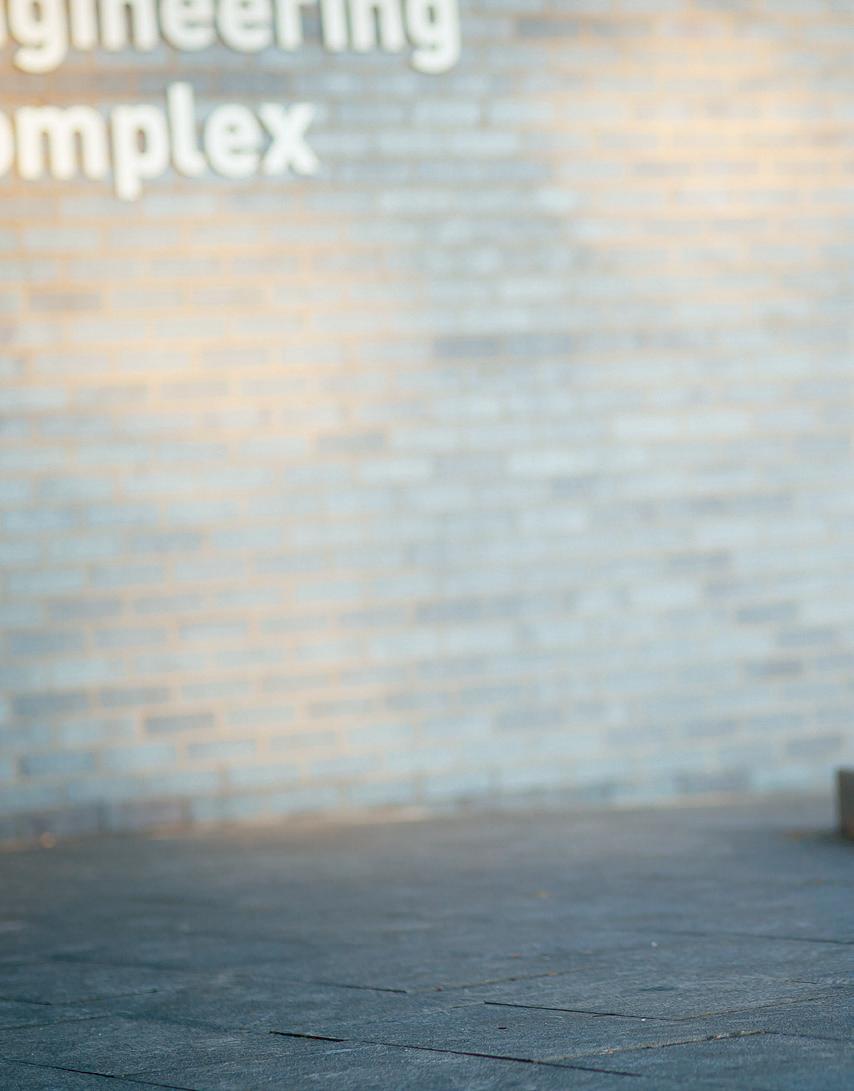
get started because it’s intimidating and I had no experience to back me up. But most professors are very understanding of that, and want to help you get started.” Ainsley’s multitude of experiences throughout her time at Tufts, including a previous internship at the only BMW production plant in the United States, has helped her learn more about what she can do with a career in mechanical engineering. “For now, I’m figuring out what I like to do in the realm of mechanical engineering…I took a design course this past semester, and I really loved it, so I think I’m going to look into CAD and using SolidWorks. But I also like the material science side of things. I’m not a chemistry person at all, but I really do appreciate material science.”
As for advice, Ainsley offers this: put yourself out there. “I have to emphasize how helpful it is to attend student panels and other Q&A sessions that are offered. Reaching out to your [optional alumni] interviewer after is a great idea, too. Also, I would like to encourage prospective women engineers to entertain their aspirations. It can feel overwhelming going into a traditionally male dominated field, but you will have such a strong support system. There are wonderful resources at Tufts such as the Women’s Center and the Society of Women Engineers that are fun to be part of.”
Ainsley’s curiosity is infectious. Her excitement when talking about creating projects, both for fun and for class, in the many facilities like the Bray Lab and the Blake Lab that are full of machine parts, and learning how to weld at the SMFA to complete assignments, was palpable throughout our conversation. Ainsley embodies the kind, collaborative, and curious Jumbo engineer: one who is happy to learn and excited to help make the world a better place with her own two hands.
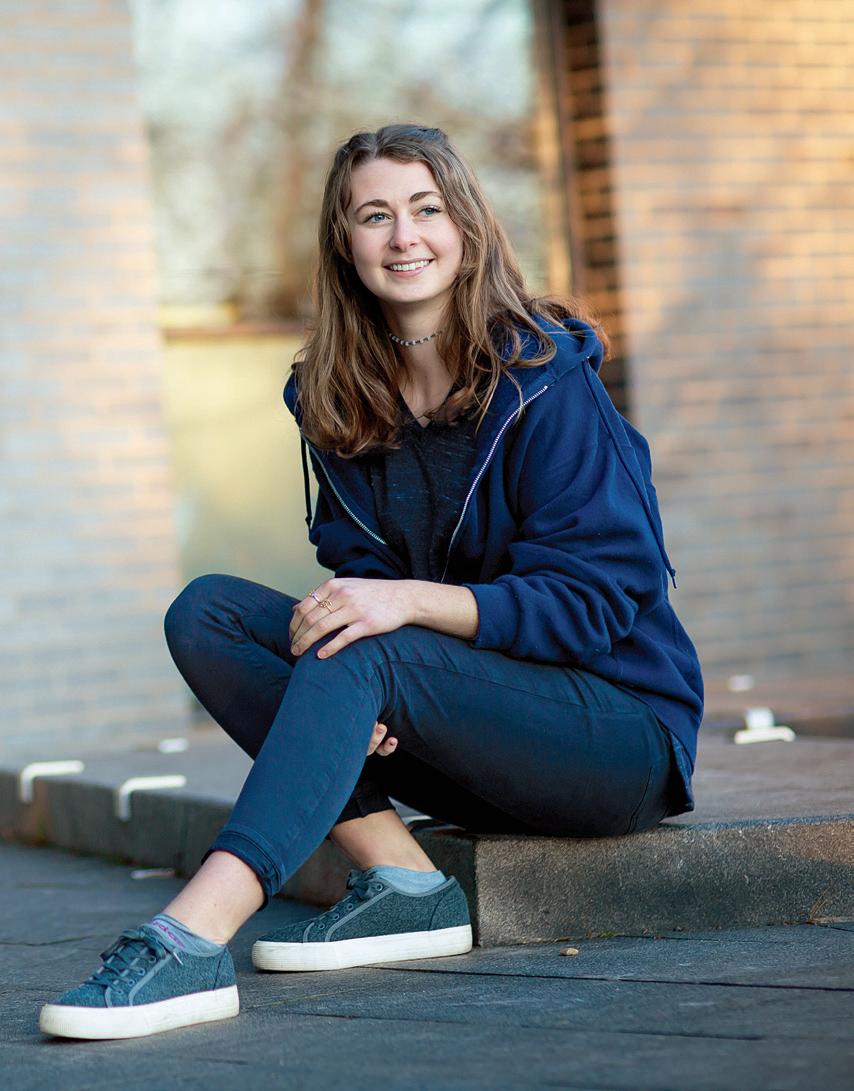
“A collaborative experience is so special to me.”
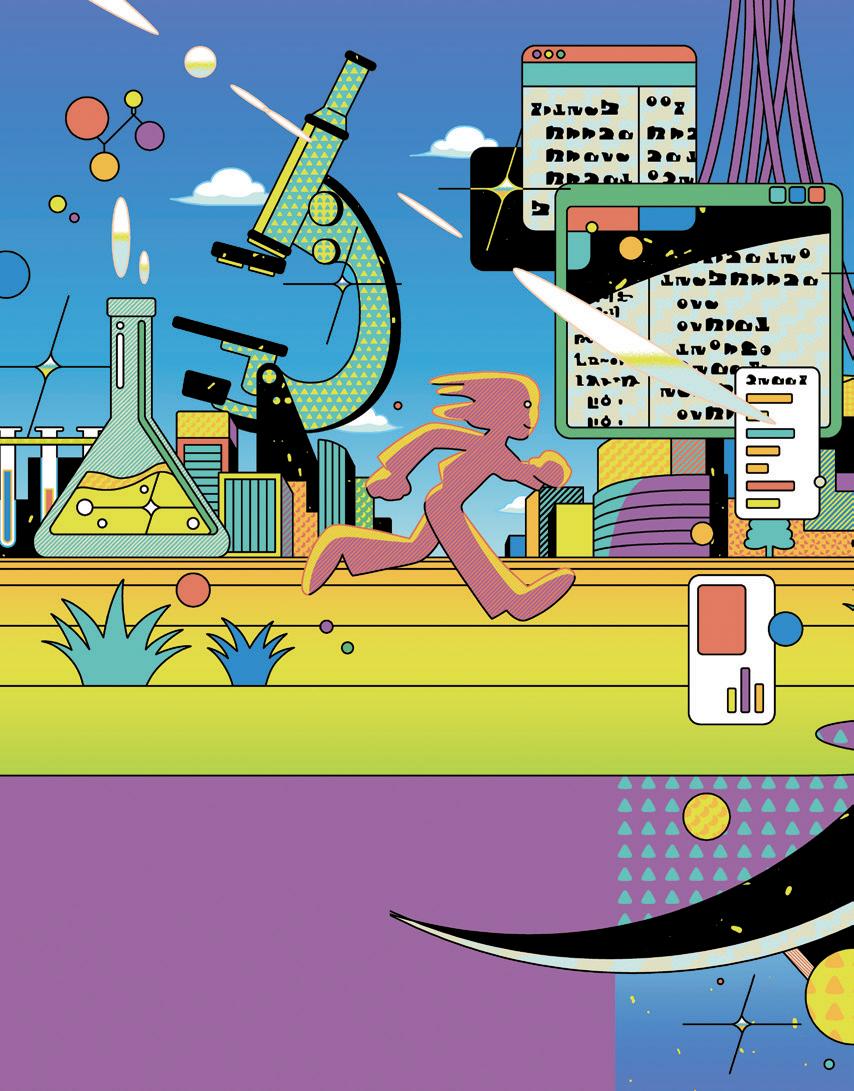
By Blake Anderson ’23 and Becky Lee ’22
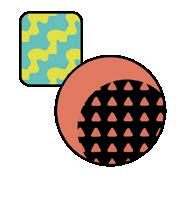

There is no one way to be an engineer. There are 16 different majors to choose from within our School of Engineering, all with their own unique niches and patterns. Read these profiles and you’ll see how Jumbos embody the various ways to be an engineer at Tufts.

BIOMEDICAL ENGINEERING (BME)
INTERVIEWEE: Michelle Sun ’24 from Taipei, Taiwan
Do you find yourself saying “it’s a great day to save lives” wholeheartedly? Do you love biology and technology? Do you enjoy having a polysyllabic major that makes people go “OOOooohhh!” all the time? Is your heart in the lab (literally)? If you answered yes to any (or all) of these questions, then a degree in biomedical engineering might be the perfect fit for you! Biomedical engineers work to improve the quality of human and animal life by studying how doctors and patients interact with medical equipment. This allows them to improve devices, drugs, and other therapeutic treatments, paving the way for future innovations in the medical field. Their work includes everything from imaging technologies to prosthetics to biocompatible drug delivery systems. At Tufts, the BME major is divided into three focus areas: regenerative medicine, drug delivery, and biomedical devices. Projects range from silk-based nanocircuitry to lab-grown hearts to dissolvable bioelectronic devices, with endless possibilities in between. According to Michelle, “I’ve always been fascinated by creations that seem impossible, and [BME] checks off all the boxes. My favorite part is tissue engineering; creating something from tiny stem cells to a fully functioning organ that could help someone is insanely interesting. I love that there is still so much to explore, and Tufts has definitely given me the knowledge, confidence, and resources to contribute to this field!” These impressive BME projects are all possible thanks to a committed student body interested in medicine and biology and professors who are more than willing to support these passions. Furthermore, through Tufts’ co-op program, students gain valuable hands-on experience in many different BME subfields and combine problem-solving and innovative thinking with technical knowledge. So, whether you find yourself in a lab with other students or in a lecture taking notes, you’ll be ready to change the world as a Tufts BME!
CHEMICAL ENGINEERING (CHEME)
INTERVIEWEE: Joseph Balkan ’24 from South Burlington, VT
Do you find tiny things cute? Chemical engineering may be right up your alley, considering how small molecules are! Chemical engineering seems easy to understand at first. After all, it’s simply chemistry plus engineering, right? Add a little bit of this, a little bit of that, cook at 365 degrees, and voilà! However, the field is much more complicated than you think. Joseph chose to study ChemE—hear what he has to say. “I’ve always wanted to develop new medicines. That’s why I chose chemical and biological engineering, a major which will allow me to design the commercialization processes of drugs once I graduate. Since our major class is only around 30 students, I have received a personal learning
experience at Tufts that will help me achieve this goal.” Chemical engineers design almost all the equipment and processes used in manufacturing plants. They also develop chemical controls and specialty materials. In other words, there is a wide range of industries chemical engineers can enter, including pharmaceuticals, technology, and pollution remediation. At Tufts, students have designed biopharmaceuticals, consumer products, fuel cells, and more in their classes and labs. Others have pursued internships to learn about waste management and find new ways to deal with environmental crises (e.g. plastic waste). Some have explored nuclear physics and kinetics in order to design reactors. Our curriculum prepares students to think on the industrial scale, where factors like heat management, fluid transport, mass transport, and process control come into play. Chemical engineering is definitely an explosive, exciting field to explore if the intricacies of chemistry captures your attention. There will never be a dull moment!
INTERVIEWEE: Clarissa Garzon ’24 from Boston, MA
Do you catch yourself admiring architecture? Were Legos your favorite childhood toy? Perhaps you should consider a future in civil engineering! From highways, buildings, bridges, and airports to irrigation systems, civil engineers have built the modern environments we live in. The discipline includes fields such as structural engineering, transportation engineering, and geotechnical engineering, and environmental fields such as irrigation engineering, wind energy engineering, soil engineering, and ocean engineering. At Tufts, students can focus on the technical side of construction by studying how buildings are built and how they interact with society. Clarissa explains this unique major well: “One thing I enjoy about my major is how small of a group we are! That leads into another reason why I love my major: the collaborative nature of being a civil engineering student. The issues that we are preparing to solve involve working with many stakeholders and many other engineers and professionals. Lastly, and more personally, the reason I choose to be a civil engineering major is the hope that I can work on infrastructure that prioritizes communities and impacts on those communities, which are lessons that I have taken away from my classes.” You might also study the science of soil behavior, create biodegradable concrete, or design LEED-certified buildings for the Tufts campus. Best of all, Boston is a city with unique engineering challenges, so students can study structures and environmental impacts in their backyard! Regardless of the path you choose, all CivEs will learn surveying techniques and develop a thorough understanding of construction materials, soil reactivity, and hydraulics. Your path to getting started can be as easy as taking the Introduction to Engineering class, Bridges for Resilient Cities
COMPUTER SCIENCE ENGINEERING (CSE)
INTERVIEWEE: Grace Ye ’24 from Hopkinton, MA
And here comes the major everyone knows...or do you really? Computer science engineering is frequently mistaken for computer engineering and vice versa. In these two sections, let’s clear up some misconceptions. First, CSE students focus primarily on the software side of computers. They work on algorithms for computer programs and digital tools. They also maintain operating systems and databases. As Grace recounts it, “one of my favorite parts of the program are the engineering classes, which give opportunities to practice coding skills and hands-on skills together, allowing us to combine our knowledge as a computer scientist and an engineer to think creatively and solve problems. This program not only teaches us how to be computer scientists, but also how to apply our skills to larger contexts to solve real-life problems.” Second, CSE students do not just program all day long. There are some branches in CSE that require more logic and problem-solving skills than coding. You do not have to be an expert in Java, SQL, C++, or Python to be a data analyst, a software tester, or a search engine optimization specialist. And if you develop excellent habits in commenting and enjoy writing, you could become a technical writer! So, don’t get scared away by the programming or math. As one of the most popular majors at Tufts and a quickly growing field, CSE opportunities are endless! There are numerous clubs and events (i.e. Tufts Polyhack, Women in Computer Science, JumboCode) that bring the CSE community together to solve problems, create apps, and gain experience. There are also many unique classes meant to encourage student exploration into CSE topic from cybersecurity to cryptology to web design. And many students research augmented reality or virtual reality—working on sensory gloves, X-ray imaging systems, and educational programs. Research in bioinformatics, artificial intelligence, and humancomputer interaction has also been gaining traction as professors partner with institutions like Logan Airport to develop scanning and targeting systems. In addition, students can find co-ops and internships in various fields ranging from data science and analytics to software development to video games. CSE goes beyond the code!
COMPUTER ENGINEERING (CPE)
INTERVIEWEE: Tom Lyons ’25 from from Wilder, VT
We’ve explored computer science engineering, so let’s take a look at computer engineering. If you’ve ever wanted to know what makes a laptop or phone tick, then this is the discipline to check out! Although it’s only a few decades old, computer engineering has quickly risen to become one of the most popular fields around the world. Unlike those in computer science engineering, computer engineers examine hardware technology more deeply. CPE students, like Tom, will study the relationship between the hardware and software sides of computer systems. “As a computer engineer, I have the opportunity to get my hands dirty interacting with and building computer hardware, all while creating impressive software to control the hardware system. The coursework is challenging, but you get to

work with other passionate students to solve complex technical tasks and create something really cool. The major is fairly small, and the department feels like a little community where I've built strong relationships with my professors and classmates. The professors all want you to succeed, and it's pretty easy and common to get involved in the department or join a research group. I love being a computer engineer and couldn't recommend the major enough,” he says. They examine electrical components and programming interfaces in order to design and manufacture technological devices. Students learn how to make a computer rather than how to use a computer. CPE is a broad discipline well-suited to those who are interested in technology as a whole. Some of the most popular industries our CPE students join are aerospace, cybersecurity, networking, and computer design. Computer design is a rapidly growing field as more advances are made in microminiaturization. Some Tufts students are also working to increase the speed of computer processing by experimenting with parallel processors, superconducting materials, and artificial intelligence.
INTERVIEWEE: Taarika Bala ’24 from Princeton, NJ
One of the hottest and newest majors on the scene—data science! It’s the buzzword among the computer science community—let’s see why. Data science is currently one of the most promising, in-demand fields. With the amount of data produced every day due to the web, it’s an information tsunami! That’s where data scientists come in. Effective data scientists gather, organize, analyze, maintain, and communicate trends so others can make data-driven decisions. Sounds like a lot, right? Data scientists are the cowboys of the computer world, wrangling herds of data into metaphorical
fences. According to Taarika, “data science is one of the fastest growing fields today. Yet, very few colleges actually offer data science as a major for undergrads. Tufts has an amazing program that is constantly evolving and accepting feedback from students and alumni. The program provides a strong foundation in math and CS, requires disciplinary breadth in a field of our choice, and still allows room for fun classes in our schedules. Jumbo DS majors are well-rounded, competitive candidates for a wide range of opportunities such as data, machine learning, and software engineering, as well as data science, data analysis, statistics, and research.” Students will learn how to analyze data to solve real-world problems through techniques such as statistics, data visualization, and machine learning. And with the co-op program, students can gain valuable industry experience and put the skills they learn—from SQL programming and modeling to technical communications—to the test!
INTERVIEWEE: Victor Vazquez ’25 from Brockton, MA
Do you admire Ben Franklin and his lightning kite experiment? May I introduce you to electrical engineering…a way less dangerous way to play Zeus? As you can guess, electrical engineering is all about electricity! More specifically, this field focuses on utilizing electrical energy and providing the maximum possible power with minimal waste. “I love the fact that electrical engineering is such a staple in our modern civilization and allows us to do amazing things. Knowing how these systems work is fascinating to me, and being able to create sustainable electrical systems and contributing to renewable energy technology is my main reason for pursuing electrical engineering,” Victor says. The EE major has two tracks. Students can concentrate on analog EE, which is more physics-driven as classes
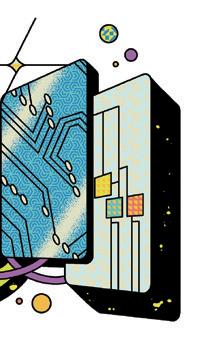
“AND HERE COMES THE MAJOR EVERYONE KNOWS ... OR DO YOU REALLY?”
are focused on wires and waves. They can also take the digital EE path, which is more data-focused and involves binary and computer logic. The digital track is actually closely aligned with the computer engineering major. Double majoring potential for all overachievers! Like most of the engineering majors at Tufts, electrical engineering is applicable everywhere (you might be noticing our interdisciplinary theme). From medicine to robotics to power distribution, students can definitely combine their EE background with other disciplines.
INTERVIEWEE: Maddie Hallen ’24 from Waterville, ME
It might not be easy being green, but it’s arguably the most pressing task of the 21st century. If you agree, environmental engineering could be your path to making an impact. Environmental engineers consider the natural environment and the impact of human activities in order to develop a sustainable society. Their work is at the forefront of climate change resiliency and global health research. Examples of student projects include designing water purification systems, designing green buildings, and remediating sites contaminated by chemical spills or human activity. Maddie explains, “Environmental engineering is a challenging major that allows you to explore engineering in relation to sustainability and public health as well as more classic forms of engineering. I chose this major because I was interested in engineering for epidemiology, and courses such as Biostatistics and Public Health Engineering have allowed me to explore topics and nuances that I hadn’t considered to be part of the field before. The community of environmental engineers is collaborative and supportive, and we all share a common love for the environment and making our planet a better place. At this point in time, facing many global
health crises related to climate, the work feels important and relevant, and keeps my motivation and passion strong.” Those studying EVE will learn about policy, urban planning, clean energy, chemistry, economics, history, public health, world culture, and justice in order to better serve their local and global communities. Tufts engineers aren’t just amazing technically. They’re also ethical, responsible, and oriented towards creating change.
INTERVIEWEE: Evy Miller-Nuzzo ’24 from Newton, MA
Human factors engineering, also known as engineering psychology or ergonomics, is yet another multidisciplinary field of study that incorporates psychology, biology, computer science, cognitive brain science, and mechanical engineering. Human factors engineers study how people interact with objects and how their mental, emotional, and physical states change. In other words, they incorporate the “human element” when designing products, processes, and systems that are safe and easy for people to use. Evy describes her major this way: “[HFE] is a unique major at Tufts that combines the psychology side of design with the mechanical engineering side. The way humans interact with the world around them is a crucial part of how devices should be built, and so many of my classes focus on critical thinking and evaluating users. These perspectives are then put into use by other classes that teach us hard skills like coding, laser cutting, computer-aided design, and more. We’re encouraged to apply our knowledge to flawed designs and even products we come up with on our own. Once you learn about a human factors concept I promise you’ll notice it everywhere you go - it’s truly an applicable (and growing!) field.” The goal of HFE is to reduce human error, increase productivity, and enhance the user experience. Although many
gravitate towards user interface/user experience (UI/UX) research, web design, artificial intelligence, and human-robot interaction, some students are applying the design thinking learned in classes to business fields like marketing and behavioral economics. Other students research for the military (fun fact: HFE began in the military), design medical devices, investigate transportation accidents, and handle communications. At its core, this major is incredibly innovative, and Tufts is one of the few universities that offer it as an undergraduate major. As HFE is housed within the Department of Mechanical Engineering, students in this major can participate in the co-op program.
MECHANICAL ENGINEERING (MECHE) INTERVIEWEE: Ainsley Woodbrown ’25 from Greenville, SC
If you like fiddling with gadgets, this last major will really grind your gears (in a good way). If I were to describe mechanical engineering in one word, it would be “tangible.” This major involves a lot of hands-on work. MechE deals with anything involving heat transfer, design, and movement in a mechanical system. In other words, mechanical engineers figure out how machines and devices work. Anything from car parts to a dishwasher to bike gears—these are all designed, built, and improved by mechanical engineers. Tufts students learn about mechanics, thermodynamics, material science, and micro/ nanoelectromechanical systems. They also learn about engineering ethics and how to design projects that will have a global impact. After all, since machinery is everywhere, no industry is beyond the scope of mechanical engineering. Students are encouraged to look beyond gears and levers by branching out into the worlds of sustainable energy, biological systems, and the human brain. No wonder it’s the most popular engineering major at Tufts! To get hands-on experience in a hands-on major, Tufts students can participate in our co-op program. They can also complete projects in design labs and machine shops. The Bray Lab and Nolop FAST Facility are some of the most popular makerspaces visited by our MechE students, who take full advantage of the state-of-the-art equipment. Recently, students have made a medical prosthesis called the iWalker 2.0 and designed air-sensitive sensors for COVID-19 respirators. Others are working on an exoskeleton made with soft robotics, and many more are researching small search and rescue robot designs. Ainsley can explain the major with enthusiasm: “In every class that I have taken, I found out more that I can do with a mechanical engineering degree. I never really thought about the design part so much and always assumed that was for computer engineers. Or material science was for chemical engineers. Mechanical engineering is so much more than just building stuff!”
If maybe one of these majors caught your attention. We encourage you to explore more! Be curious! Challenge yourself! And keep in mind, you don’t have to know which major is right for you when you apply to the School of Engineering. You have until the spring of your first year to declare, and there’s a ton of exploration beforehand.
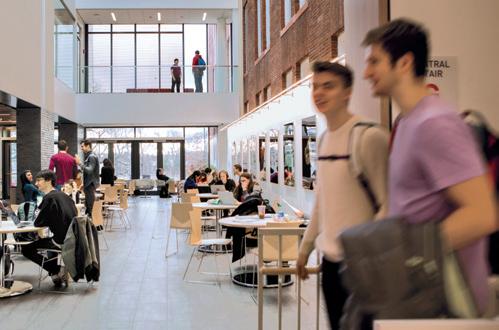
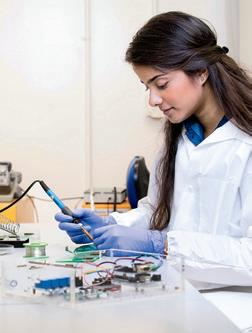
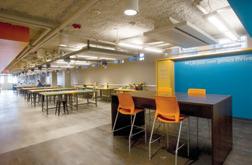
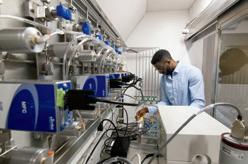
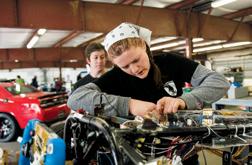
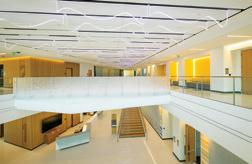
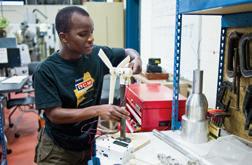
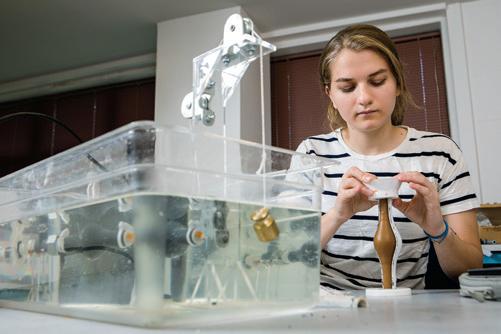
Center for Engineering Education and Outreach (CEEO): The CEEO has more than 20 years of experience in improving engineering education in the classroom, from kindergarten to college. The engineering education research program is aimed at understanding how kids and adults learn engineering, which informs the CEEO’s development of educational tools for the classroom.
The CEEO buzzes with activity on a daily basis, with undergraduate students developing and testing innovative educational technologies, staff members facilitating teacher workshops, and visiting professors sharing their knowledge.
Tufts Gordon Institute: For over three decades, the Gordon Institute has provided students with the knowledge and skills they need to be impactful leaders—-from individual projects to entire companies. In engineering management, foundations for future leadership and entrepreneurship programs, students are taught by faculty who have started and run their own companies. Through classes, hands-on projects, events, and workshops, students gain the tools necessary to develop innovative ideas—and many go on to become leaders in public, private, and nonprofit companies.
Science and Engineering Complex (SEC): The SEC reflects Tufts’ interdisciplinary culture and shared belief that collaboration strengthens education and increases the potential for discovery. A 175,000-square-foot facility, the SEC features laboratory suites, teaching laboratories, and social spaces—including a light-filled atrium where students gather to work and chat.
Bray Lab: Part of the Department of Mechanical Engineering, the Bray Lab machine shop is a full manufacturing facility featuring manual and CNC lathes and milling machines, laser cutters, 3D printers, band saws, and drill presses.
Center for STEM Diversity (CSD): Established in 2008, the CSD partners with the School of Engineering and the School of Arts and Sciences to foster a diverse and inclusive science and engineering learning environment. The CSD focuses on strengthening meaningful student participation in science and engineering, specifically for those historically excluded from the STEM fields, including women, Black Americans, Native Americans, members of the LGBTQIA+ community, and those who identify as Hispanic and/or Latinx. The CSD also works intentionally with first-generation college students and with students from low-income backgrounds.
Nolop FAST Facility: As a makerspace open to everyone at Tufts, the main goal of the Nolop FAST Facility is to help students succeed in making something amazing by providing a large collection of well-maintained tools and teaching safe use. Tools include 3D printers, a laser cutter, a CNC router, a power drill, a table saw, a miter saw, and many others.
Joyce Cummings Center (JCC): Located right next to the new Green Line MBTA station, the recently completed JCC is home to the Data Intensive Studies Center, the Departments of Computer Science, Economics, and Math, and the Tufts Gordon Institute. State-of-the-art laboratories, brand new classroom and event spaces, and ample room for studying and collaborating with peers are open and available to every Tufts student. And if you need a snack break, there’s even a Starbucks on the first floor.
The Venture Lab: The Venture Lab, located on the first floor of the Collaborative Learning and Innovation Complex (CLIC) building at 574 Boston Avenue, is a working space specifically designed for student-led startup groups to connect and collaborate on their projects and ideas. It is also a major resource for students to connect with professionals who are experts within their field or industry through oneon-one office hours. Many groups who use the Venture Lab participate in the annual $100k New Ventures Competition—where teams of student entrepreneurs compete for a slice of $100,000 to fund their business plans.
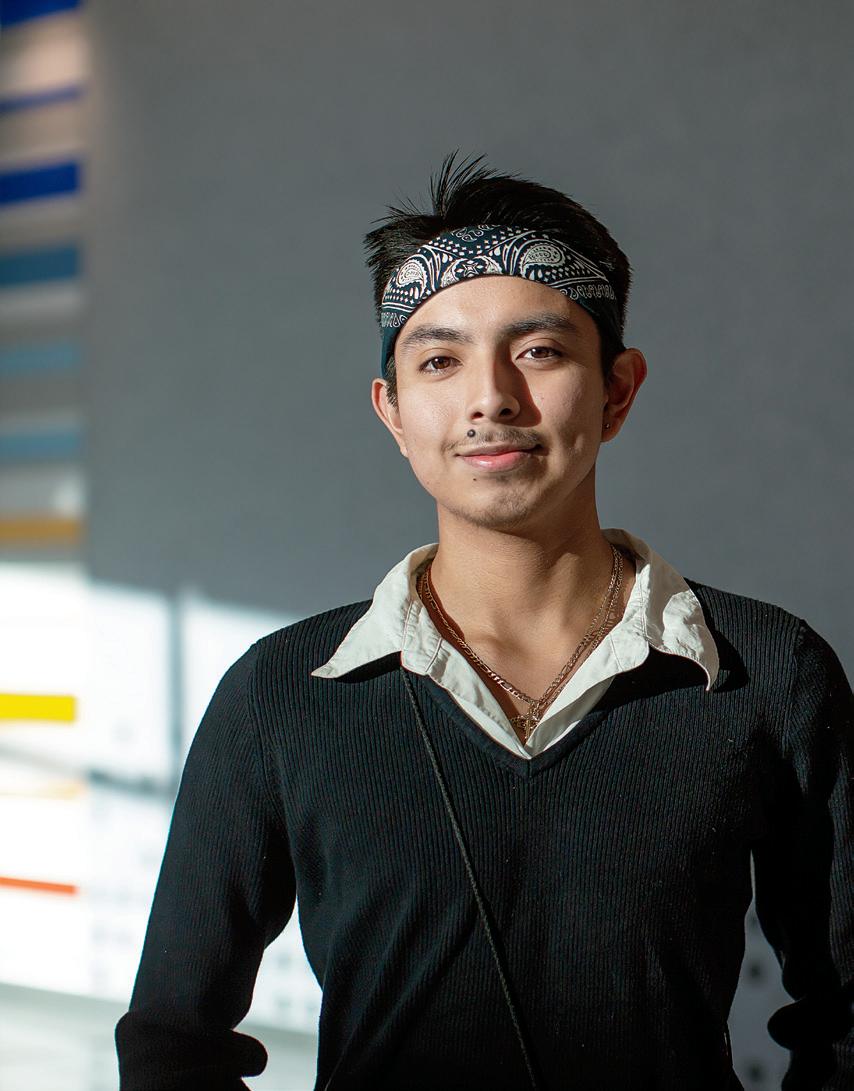
“Regardless of major, the School of Engineering wants to nurture your passion and curiosity.”
Talking to Angel, it feels like they have done just about everything they possibly could at Tufts. Angel has served as president of the Tufts Society of Latinx Engineers and Scientists, was part of the Bridge to Engineering Success at Tufts (BEST) program, and interned for Microsoft twice, all while finding home and community in myriad spaces on the Hill. Warmth and exuberance flow through everything they say, so much so that it feels like a disservice not to share their exact words with you. Here is an edited and condensed transcript of Angel’s responses to our questions, so you can hear for yourself what their Tufts experience is like.
“When applying to schools, I spent hours looking for an engineering school that would let me explore my countless non-engineering passions. I wanted a school that had a great engineering program, but also kept things fun for its students. After all, I did not want to spend all of my free time doing homework. However, all the other schools I found were either super serious STEM schools or really interesting interdisciplinary liberal arts schools with no engineering major.
When people ask me why Tufts, I usually mention an engineering education at a liberal arts university, [with opportunities like] being able to take classes at the School of the Museum of Fine Arts (SMFA), or having the amazing Division of Student Diversity and Inclusion (DSDI) Centers where I have been an intern planning fun events like Fruity Paint Night, Embroidery Nights, and Cooking Events. Or I can mention the amazing programs meant to support and empower students from diverse backgrounds such as BEST, the BEAST Pre-Orientation Program, or any of the programs offered by the Center for STEM Diversity.
I actually applied to Tufts as a civil engineering major, but Tufts allowed me the flexibility to explore different types of engineering through my introductory courses. My first engineering class was about using engineering concepts to make toys for kids! Taught by the spectacular Briana Bouchard, not only was it fun, it was the first time I was exposed to mechanical engineering and computer science. My favorite toy I created used machine learning to create a facial recognition cube which would light up different colors based on how the camera interpreted your emotions. If you were angry, it would light up red on the side with the angry face. If you were happy, it would light up green on the side with a smiley face. I even filmed a funny commercial to present it! Then in the spring I took my first computer science class and fell in love! I loved the process of designing, coding, debugging, and testing so much.
What really pushed me to switch to computer science was actually thanks to the BEST program. One of the older members of BEST sent out a computer science internship opportunity to other BESTies. I applied and when I was accepted, I took it as a sign to make the switch. Ever since then, I have spent my summers working for Microsoft in breathtaking Seattle, WA. Thankfully, all the classes I took freshman year easily counted for my new major! It just goes to show that you do not need to know your major in high school. Heck, I didn’t even know my major until my second year. If you are scrambling to pick one, just know that at Tufts you do not need to know right now. If you are undecided, gush about your passion for STEM or about a really cool concept that you could talk about for hours. Regardless of major, the School of Engineering

wants to nurture your passion and curiosity, along with being flexible when plans change!
For me, community means everything. Community is the reason I will continue to smile after I get a bad grade. Community is the feeling of home when I share a meal with friends. Community is the shoulder I cry on when I hear bad news. Community is the family I found away from home. I found many of my communities through the DSDI Centers, which host a ton of events and programs for me to find other people who share the identities I do. From there, I was able to meet many people with many different stories. Each person and their accomplishments at Tufts has been an inspiration.
Another source of community was the Indigenous Student Organization at Tufts (ISOT). I have been a part of ISOT all throughout college. I was there when it was just starting and I was there when we submitted our documents to be officially recognized. I was there when we planned our Indigenous People’s Day Celebration, and I was there when we fought for the brand new Indigenous Center. Community at Tufts not only means finding a group you can call family, it means using your resources and collective strength to give back to said community.
When you apply I would say focus on your passions and values. What do you hope to learn more about? What do you hope to be involved with? How will you overcome challenges? When I applied to Tufts, I had zero internship experience and zero research experience. I was a student from a performing arts school applying to an engineering school. Focus on showing your strength of character and the values that drive you to learn and overcome. Never feel discouraged because of your background because any school would be lucky to have you!”

P R O F E S S I O N A L
Tufts offers a wide variety of ways for students in the School of Engineering to develop—whether it be as community members, students, or working professionals. Outside of the multitude of research opportunities and labs where Jumbo engineers can gain hands-on experience, there is another, lesser known, experience for dedicated students: the Co-Op Program. Read on to learn more about this program unique to certain engineering majors here at Tufts.
Launched in 2018, Tufts’ School of Engineering Co-Op Program is a relatively new initiative that has already had a large impact. Through this program, students majoring in the Departments of Biomedical Engineering (BME), Mechanical Engineering (ME), and Computer Science (CS) are able to spend a semester of their undergraduate career working fulltime for a company of their choice. Since human factors engineering (HFE) and data science (DS) are available under the Departments of Mechanical Engineering and Computer Science respectively, students in those majors are able to complete the program as well.
As students are not taking courses at Tufts during the semester they are working, they do not pay Tufts tuition. Though they remain Tufts students
for the duration of the program, the full-time work also comes with a full-time salary offered by the company they work for. As all participants in co-ops are still Tufts students, they can still participate in varsity and club sports, use the library and other campus services, and attend any Tufts events, even though they are not enrolled in any courses or earning any academic credits during that time. Since students are not taking courses, they are not able to receive financial aid during this time, but all earnings from co-op opportunities will not count towards future financial aid eligibility. International students are also eligible for the program through curricular practical training, which authorizes off-campus experiential learning that is related to and integral for their field of study. For all students, this program
focuses on providing on-the-job experiences for undergraduates interested in learning more about career opportunities in their engineering field by creating moments for students to network with and learn new skills from industry professionals.
All interested students must take a course, prior to their co-op, where they learn career development and basic employment competency skills like resume and cover letter writing, LinkedIn and networking skills, interview and negotiation techniques, and the general expectations of being a working professional. Students enroll in different sections of the course specific to their major. Each course is facilitated by a Tufts faculty member from that specific department, along with the support of members of Tufts Career Services who
Insulet
Takeda
Bose Corporation
Fermilab
Honda R&D Americas
Nimble Robotics
Raytheon Aerospace
Bristol Meyers Squibb
Covidien
Medtronic
Micro Leads
Moderna
SQZ Biotechnologies
Vertex
Vaxess Technologies
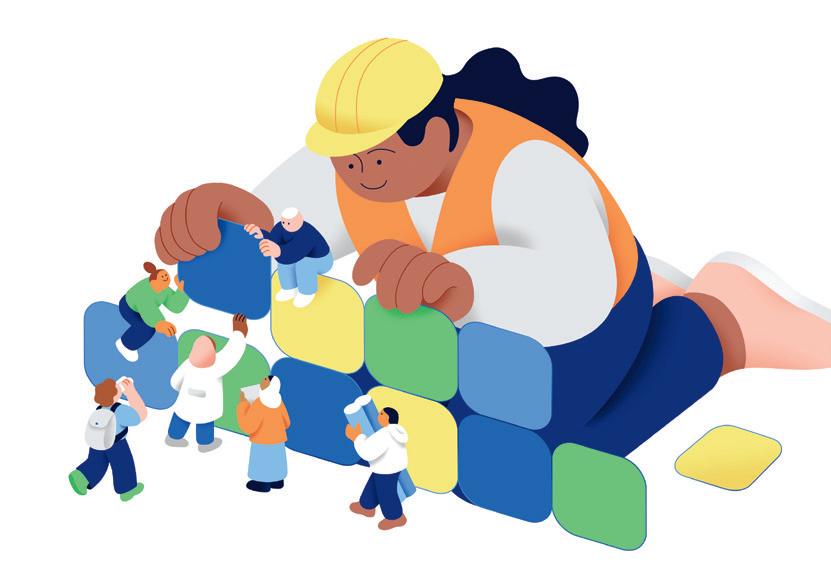
not only teach students, but also help them make sure that they will be able to fit the program into their schedule. Industry guest speakers also make appearances, providing even more opportunities for networking and career development through their insight and expertise.
After taking the introductory course, students will move on to full-time work the following semester at a company whose work is in line with their program of study. Students are expected to take the skills they’ve learned in the introductory course to find a co-op that best fits their interests, with some help from the Career Center along the way. Robin Kahan, the Associate Director of Engineering Career Services in Tufts’ Career Center, says, “We are always looking for companies to hire students for co-ops, internships, or full-time positions.” Some companies will post positions to Tufts Career Center sites specifically for members of the program, which makes finding a position incredibly easy. Opportunities are posted by the companies
on Handshake, the job aggregation site that Tufts uses for its students and alumni, and must include the title, pay, and benefits that students will be eligible for.
Though the program requires an academic semester, each full-time job that students work through the program takes six months to complete. For those who are worried about finding the time, or credits, to make this program fit within their schedule, Robin has only assurances. “Many students can do [the program] and graduate on-time because they have pre-matriculation credits, take courses during summers, or [take extra courses during the semester] while at Tufts.” Some students are such big fans of the program that they do it more than once. “We have had at least one student do two co-ops and graduate a year later than her class, but with a year of great experience under her belt.”
Participating in the introductory course mentioned earlier does not necessitate participating in fulltime professional work for a semester either. It can
include just taking on an internship for the bulk of the semester or summer. Many students have “decided to do the three month internship rather than do a co-op” depending on their situations and plans for their undergraduate careers and future. Regardless of where the course leads, on its own it is an incredible career development opportunity, both for the connections students are able to make and for the interview and workplace skills they gain which they can carry with them into their future. For some, that future may be even closer than they expected. According to Professor Qiaobing Xu, who teaches the introductory co-op course for BME students, “One student worked at Vaxess through this program and was recruited as a full time employee after she graduated.”
So if you’re curious, reach out to someone involved in the program! You never know what doors may open for you when you do.
PROFESSOR
Professor Pérez’s journey to Tufts took many twists and turns that all had two core traits: a passion for engineering and education. Her career began in Puerto Rico where she worked as a civil and environmental engineer on flood maps and sediment analysis. Later, she was an elementary school science teacher working primarily with bilingual students in Texas, beginning her teaching career at a time when engineering standards were just being introduced to classrooms. All along the way, Professor Pérez saw firsthand how connection with the local community was integral to engineering practice. “I quickly realized that the element of what people know in their communities was very important for the role of what we were doing as engineers.”
Her connection with students was incredibly impactful, even very recently. “Just this year, one of the students that I taught in elementary school called me saying that she’s going to apply to college and that she’s going to become a civil engineer. I remember that we did a study of water quality in a creek near the school—we did some testing, and they discovered that there was lead in the water. And they felt really empowered to spread the word to the other children who typically will play there to say, ‘there are pollutants in the water, and there are things that we can do to avoid that.’ So engineering is an avenue to generate those kinds of changes in their communities.”

Empowering people, especially students, towards using engineering to make their community a better place also played a large role in Professor Pérez’s graduate education. “I was a doctoral student at Stanford in the learning sciences. I mostly studied how people learn engineering across their lifespan from when they are children until undergrad and beyond.” Over the past few years at Tufts, Professor Pérez’s research followed that same general interest. “I look at engineering in communities, first in the general context, and then I do applications to specific disciplines and how we can connect communities with engineering. I also think about the language and cultural practices of communities and the ways that people make sense of ideas in their local context, the ways that people understand the world around them, and how much of all of that is already engineering and has not been explicitly connected with the things that engineers do.” She currently oversees a multitude of projects, including one working with the National Renewable Energy Laboratory in Colorado that is researching how we can “rethink energy incentives by incorporating input from local communities,” another where students are prototyping video games to “bring communities knowledge about engineering as a way to help us think about inequities…the things that engineers do, or the different pathways that one could could imagine oneself as an engineer,” and one where a graduate student is researching
“Black epistemologies in making, in particular how youth understand hip-hop through an engineering lens.” Nearly all of these projects involve working with local communities that are multilingual, immigrant, and/or underserved, creating pathways to engineering education and empowering communities. But that’s not all! Professor Pérez was recently awarded a National Science Foundation grant to facilitate climate technology engineering education in Somerville schools, bringing increasingly relevant engineering educational practices to the engineers of tomorrow in our local community.
It should come as no surprise that representation is important for Professor Pérez. Making sure that students can envision success, especially in STEM fields, is important to the work that she does.
“If we look at engineering faculty, it’s a very homogeneous group of of people. [The students I work with] have found both an intellectual community in the lab but also a community that understands where they come from and values where they come from.”
There is no doubt that with Professor Pérez’s hard work, and the space that she has provided over the years both in her lab and across the whole United States, that this world will be a brighter place.
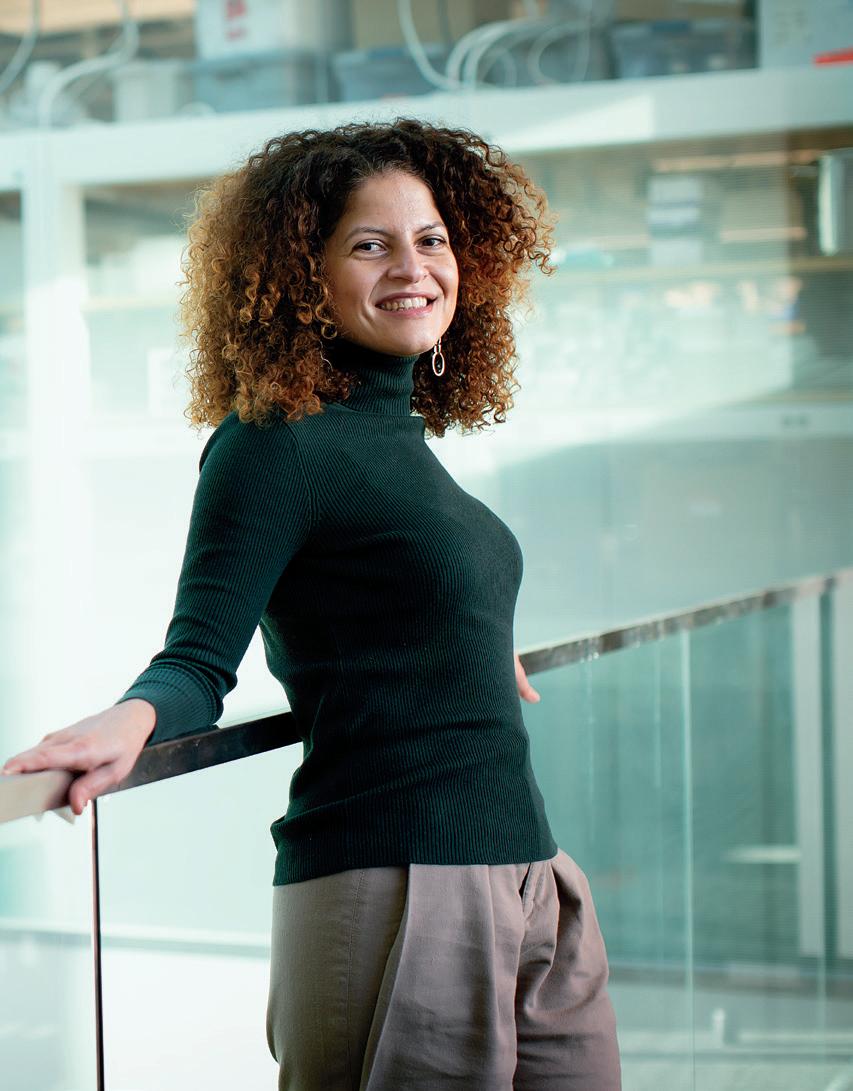
“I quickly realized that the element of what people know in their communities was very important for the role of what we were doing as engineers.”
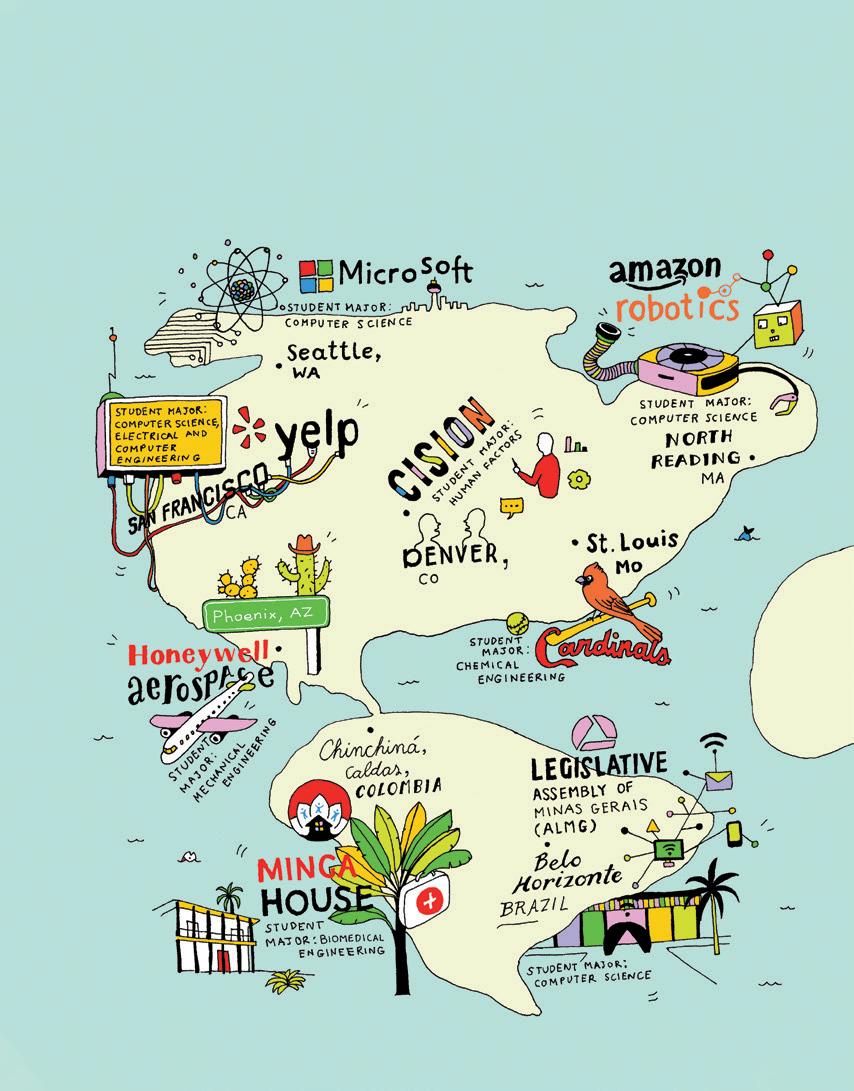
Whether it is through an internship, full-time job, or grant through the new Global Research Assistant Program, Jumbo engineers go across the country (and the world) to create solutions to problems facing society today.

WHAT TO SUBMIT: HERE’S THE LIST. FIND MORE DETAILS ON OUR WEBSITE!
4 1 2 3 5 6 7 8 +
Common Application, Coalition Application, or QuestBridge Application
Tufts Short-Answer Questions
High School Transcript(s)
Senior Year Grades
Testing (Optional)
We accept either the ACT or the SAT; neither is required. Applicants may choose whether they wish to have exam scores considered as one component of their application.
Letters of Recommendation
We require one from a school counselor and one from a teacher in a junior or senior year major academic course (math, natural science, social science, English, or a world language). You may send us one additional if you’d like.
Art Portfolio
Required only for applicants to the BFA and Combined Degree (BFA + BA/BS) programs.
Financial Aid Documents for US Citizens
If you are applying for aid, you will need to submit: 1. FAFSA 2. CSS Profile 3. Federal Income Tax Returns
For more information, or for foreign nationals, please visit students.tufts.edu/financial-services-home.
Additional Materials (Optional)
• Alumni Interview
• Arts or Maker Portfolio: Students applying to the School of Arts and Sciences or the School of Engineering may submit an optional arts or maker portfolio to highlight talent in studio art, drama, dance, music, or engineering.
APPLICATION DEADLINES AND NOTIFICATION DATES*
Early Decision I
Application Deadline: Early November
Notification Date: Mid-December
Early Decision II
Application Deadline: Early January
Notification Date: Early February
Regular Decision
Application Deadline: Early January
Notification Date: By April 1
Transfer Admission
Application Deadline: Mid-March
Notification Date: Mid-May
*Please visit admissions.tufts.edu/apply for the most up-to-date information on deadlines.
TUFTS
34,000+ first-year applications
11% admitted
100% of demonstrated financial need met for all admitted students
In the first four years of our SAT/ACT test-optional pilot, around 50% of applicants and around 60% of admitted students submitted scores. Please review our website for the latest information about our testing policies.
Please visit our Class of 2028 Profile, available online in September, for more information.
TUFTS UNDERGRADUATE STATISTICS
6,815 Undergraduate Enrollment
4.8 Miles from Boston
20 Average Class Size
28 Varsity Sports Teams
350+ Student Groups
46% Women in the School of Engineering
45% of Juniors Study Abroad
$55,697 Average Grant Award
88 Countries Represented
THE BASICS WHAT IS FINANCIAL NEED? Cost of Attendance Tuition and fees Food and housing Books and supplies Personal expenses
Your Expected Family Contribution (EFC) is the amount your family is expected to pay for college for the academic year. It is calculated from the information provided on your Free Application for Federal Student Aid (FAFSA), CSS Profile, and your family’s federal tax returns. Your financial need is the difference between the annual cost of attendance and your calculated family contribution. Your financial aid package will make up the difference, for all four years—even if your family’s situation changes. We generally do not include student loans for students whose families earn less than $60,000 per year. All Tufts financial aid is need-based—we do not offer merit-based scholarships or athletic scholarships.
*Grants are need-based gift aid that are not paid back.
*Please review the financial aid website for the most up-to-date information and deadlines: admissions.tufts.edu/tuition-and-aid
COMPLETE THE REQUIRED DOCUMENTS:
Free Application for Federal Student Aid (FAFSA)* fafsa.ed.gov
Tufts code: 002219
Cost: free
*Note: not required of international or undocumented applicants for financial aid
College Scholarship Service (CSS) Profile cssprofile.collegeboard.org
Tufts code: 3901
Cost: $25 initial fee plus $16 for each additional college. Fee waivers are available for students who qualify for an SAT fee waiver or whose family incomes are below $45,000.
Non-Custodial Profile (NCP): if your parents are divorced or separated. The requirement may be waived by the Tufts Financial Aid Office under very specific circumstances.
Federal Income Tax Returns
BY THE DEADLINE*:
Early Decision Round II Regular Decision
For questions while applying: HOW DO I APPLY?
Applicants should submit all documentation to IDOC (idoc.collegeboard.org/idoc). Your account will be created at idoc.collegeboard.org once you submit the CSS Profile. Please do not send tax returns directly to Tufts Admissions or Financial Aid.
For International Students International students applying for financial aid must submit the CSS Profile with supporting documents submitted through IDOC. If the CSS Profile cost would cause significant financial hardship for your family, you may instead complete the International Student Financial Aid Application (ISFAA) through your Tufts portal once your application has been submitted. The completed ISFAA supporting documents must be submitted through your Tufts applicant portal.
If you are applying for financial aid at Tufts and have a Social Security number, please make sure to include that information in your application for admission so your materials can be properly matched. Application Type Early Decision Round I
To estimate the amount of financial aid you might receive if admitted to Tufts:
Tufts Net Price Calculator npc.collegeboard.org/student/app/tufts
CSS Profile 305-420-3670 FAFSA 800-433-3243 “Chat With Us” Service IDOC 866-897-9881 (US and Canada) 212-299-0096 (International)
With nearly 150 majors and minors, 30 interdisciplinary programs, and the courses of the Experimental College, Tufts’ offerings require more than a brief skimming, so you can find an expansion of this quick list on our website. But in the meantime, skim away. Just note that Tufts’ undergraduate programs are offered in three schools: Arts and Sciences, Engineering, and the School of the Museum of Fine Arts. Students may take classes across schools, and many students do.
Africana Studies
American Studies
Ancient World Studies
Anthropology
Applied Environmental Studies
Applied Mathematics
Applied Physics
Arabic Language and Cultural Studies
Archaeology
Architectural Studies
Astrophysics
Biochemistry
Biology
Biomedical Sciences1
Biopsychology
Biotechnology1
Chemical Physics
Chemistry
Child Study and Human Development
Chinese Language and Cultural Studies
Civic Studies1
Clinical Psychology
Cognitive and Brain Science
Community Health
Computer Science
Economics
Education1
Engineering Psychology
English
Environmental Geology
Environmental Studies1
Film and Media Studies
French and Francophone
Cultural Studies
French and Francophone
Literary Studies
Geological Sciences
German Language and Cultural Studies
German Studies
Greek
Greek and Latin
History
History of Art and Architecture
Interdisciplinary Studies
International Literary and Visual Studies
International Relations
Italian Studies
Japanese Language and Cultural Studies
Judaic Studies
Latin
Latin American Studies
Mathematics
Middle Eastern Studies
Music, Sound, and Culture
Philosophy
Physics
Political Science
Psychology
Quantitative Economics
Race, Colonialism, and Diaspora Studies
Religion
Russian and Eastern European Studies
Russian Language and Cultural Studies
Science, Technology, and Society1
Sociology
Spanish Cultural Studies
Spanish Literature Studies
Theatre, Dance, and Performance Studies
Women’s, Gender, and Sexuality Studies
SCHOOL OF ENGINEERING MAJORS
Architectural Studies
Biomedical Engineering
Biotechnology1
Chemical Engineering
Civil Engineering
Computer Engineering
Computer Science
Data Science
Electrical Engineering
Engineering
Engineering
Physics
Engineering
Science
Environmental Engineering
Environmental Health
Human Factors
Engineering
Mechanical Engineering
All BFA students at SMFA at Tufts focus in interdisciplinary art. They may explore many of the following areas of study while pursuing this interdisciplinary art education.
Animation
Book Arts
Ceramics
Digital Media
Drawing
Fibers
Film
Graphic Arts
Illustration
Installation
Jewelry
Metals
Painting
Papermaking
Performance
Photography
Printmaking
Sculpture
Sound
Video
Virtual Reality
FIVE-YEAR COMBINED DEGREE PROGRAMS
Arts & Sciences/SMFA
Combined Degree: BA or BS and Bachelor of Fine Arts
MINORS
Africana Studies
American Politics
Analytical Chemistry
Ancient World Archaeology
Applied Computational Science3
Arabic
Architectural Engineering3
Architectural Studies
Asian American Studies
Astrophysics
Biological Anthropology
Biophysical Chemistry
Biotechnology
Cellular Agriculture
Chemical Engineering2
Chemical Mechanism and Structure
Chemical Physics
Chemistry
Chemistry of Life
Child Study and Human Development
Chinese
Cognitive and Brain Science
Colonialism Studies
Comparative Politics
Computational Chemistry
Computer Science
Cultural Anthropology
Dance
Economics
Education
Embedded Systems2
Engineering
Education2
Engineering Management
English
Entrepreneurship
Entrepreneurship for Social Impact
Environmental Science and Policy2
Film and Media Studies
Finance
Food Systems and Nutrition
Foreign Policy Analysis
Foundations for Future Leadership2
French
Geology2
Geoscience3
Geosystems2
German
Greek
Greek Civilization
Hebrew
History
History of Art and Architecture
Human Factors Engineering2
Italian
Japanese
Judaic Studies
Latin
Latin American Studies
Latinx Studies
Linguistics
Materials Engineering
Materials and
Surface Chemistry
Mathematics
Medical Anthropology
Medieval Studies
Museums, Memory, and Heritage
Music, Sound, and Culture
Music Engineering
Native American and Indigenous Studies
Peace and Justice Studies
Philosophy
Physics
Political Economy
Political Science
Political Thought
Portuguese
Religion
Roman Civilization
Russian
Science, Technology, and Society
Social Justice Anthropology
Sociology
Spanish
Studio Art
Theatre and Performance Studies
Urban Studies
Visual and Material Studies3
Women’s, Gender, and Sexuality Studies
1 Available only as a co-major
2 Available only to students enrolled in the School of Engineering
3 Available only to students enrolled in the School of Arts and Sciences
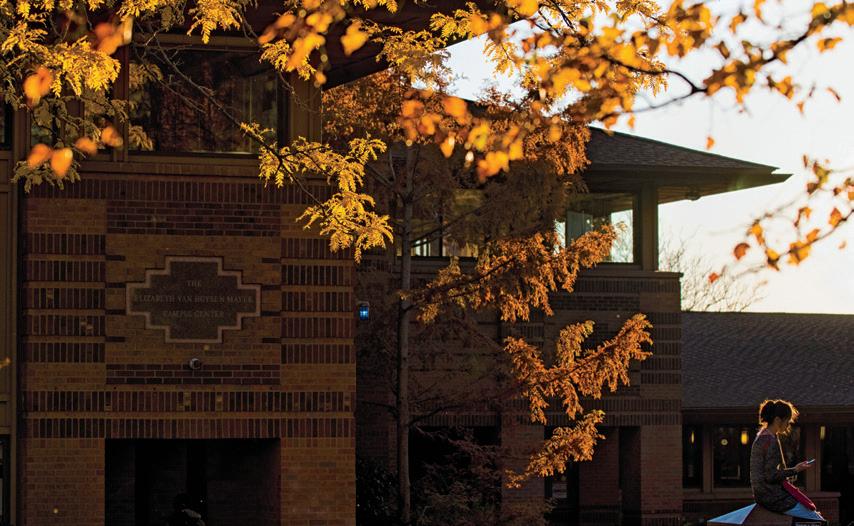
Tufts is a student-centered research university, which means that we like to dig into our passions deeply and figure things out for ourselves—whether that involves using silk to regenerate tissue or spending a fully-funded summer exploring the political implications of Shakespeare’s plays through the Summer Scholars program. Students and professors come together, across disciplines, to ask questions and create meaning.
Jumbos use their skills and ideas to better people’s lives, whether they are teaching engineering in local elementary schools, creating sustainable businesses, or spending a semester in Peru or Thailand immersed in social and environmental justice as part of the Tufts Civic Semester. They understand that they are citizens of a global community, and they embrace that responsibility.
…in a lot of things. Tufts students don’t limit themselves: they combine biology with philosophy, compete as nationally-ranked D-III athletes, pursue Bachelor of Fine Arts degrees in studio art at our School of the Museum of Fine Arts, and solve problems as engineers. They’re part of a community that embraces the unconventional and the uncategorizable.
This is a place where students are as excited to debate fan theories as they are to apply mathematical theorems—as intellectually playful as they are powerful. We believe that ideas can have a profound impact on the world, and those ideas can be born around the seminar table but also in the residence hall common room.
Sound about right? Read the stories here to learn more. Also check out our website: admissions.tufts.edu
Tufts does not discriminate in admissions, employment, or in any of its educational programs or activities on the basis of race, color, national or ethnic origin, ancestry, age, religion or religious creed, disability or handicap, sex or gender (including pregnancy, sexual harassment and other sexual misconduct including acts of sexual violence such as rape, sexual assault, stalking, sexual exploitation, sexual exploitation and coercion, relationship/intimate partner violence and domestic violence), gender identity and/or expression (including a transgender identity), sexual orientation, military or veteran status, genetic information or any other characteristic protected under applicable federal, state or local law. Retaliation is also prohibited. Tufts will comply with state and federal laws such as M.G.L. c. 151B, Title IX, Title VI and Title VII of the Civil Rights Act, the Americans with Disabilities Act, Section 503 and 504 of the Rehabilitation Act of 1973, the Age Discrimination in Employment Act, the Vietnam Era Veterans Readjustment and Rights Act, Executive Order 11246 and other similar laws that prohibit discrimination, all as amended. Tufts is an equal employment opportunity/affirmative action employer. More detailed Tufts policies and procedures on this topic may be found in the OEO Policies and Procedures page.
Any member of the Tufts University community has the right to raise concerns or make a complaint regarding discrimination under this policy without fear of retaliation. Any and all inquiries regarding the application of this statement and related policies may be referred to: Jill Zellmer, MSW, Executive Director of the Office of Equal Opportunity, Title IX and 504 Coordinator, at 617.627.3298 at 196 Boston Avenue, 4th floor, Medford, MA 02155, or at Jill.Zellmer@tufts.edu. Anonymous complaints may also be made by reporting online at: tufts-oeo.ethicspoint.com. As set forth in our
individuals may also file complaints with administrative agencies such as the U.S. Department of Education, Office for Civil Rights (“OCR”). The contact
Rights, Boston Office U.S. Department of Education, 8th Floor, 5 Post Office Square, Boston, MA 02109-3921. The email address
OFFICE OF UNDERGRADUATE ADMISSIONS
Tufts University
Bendetson Hall
2 The Green Medford, MA 02155-7057
617-627-3170
admissions.tufts.edu
